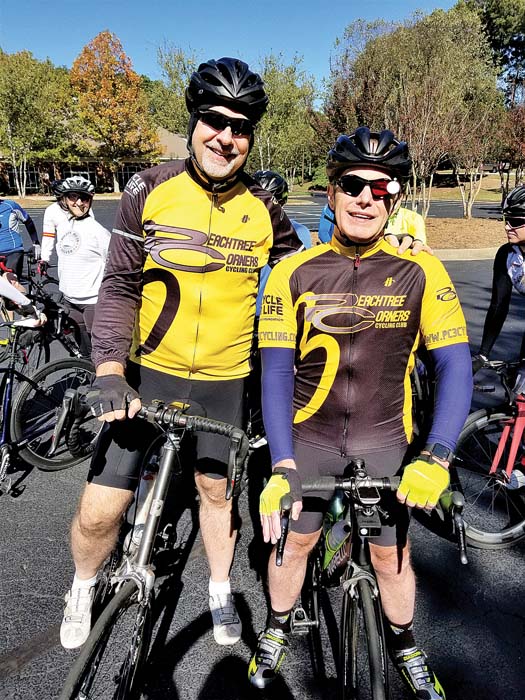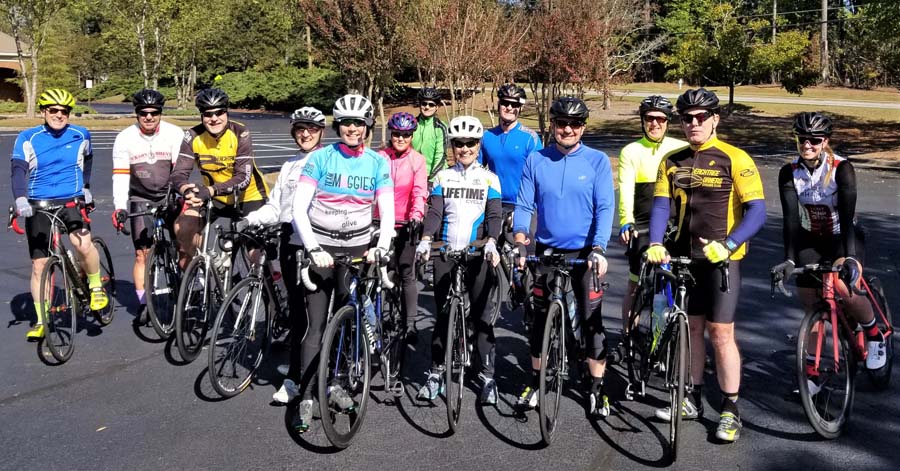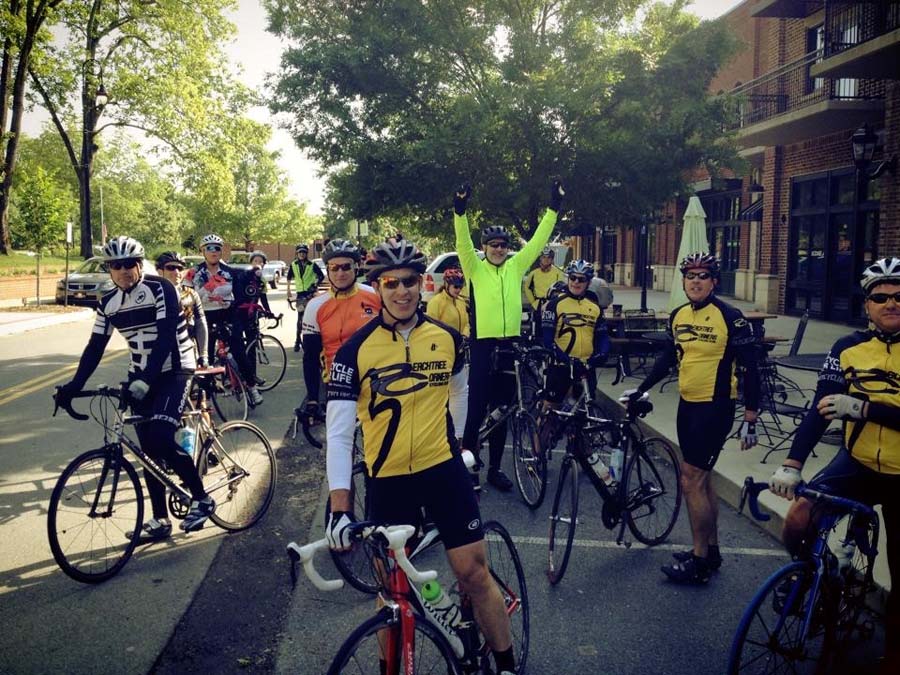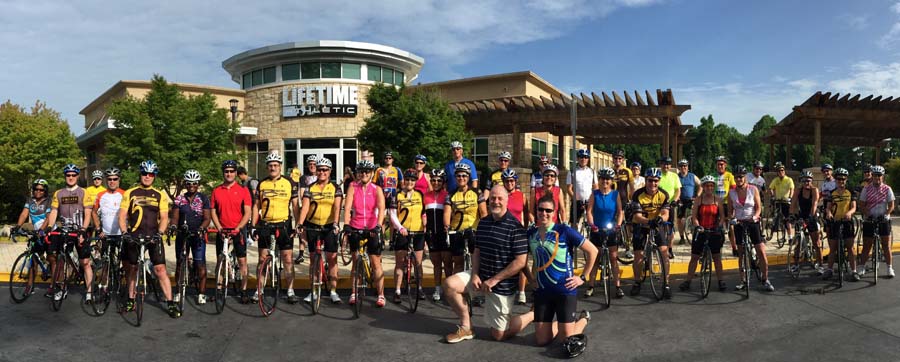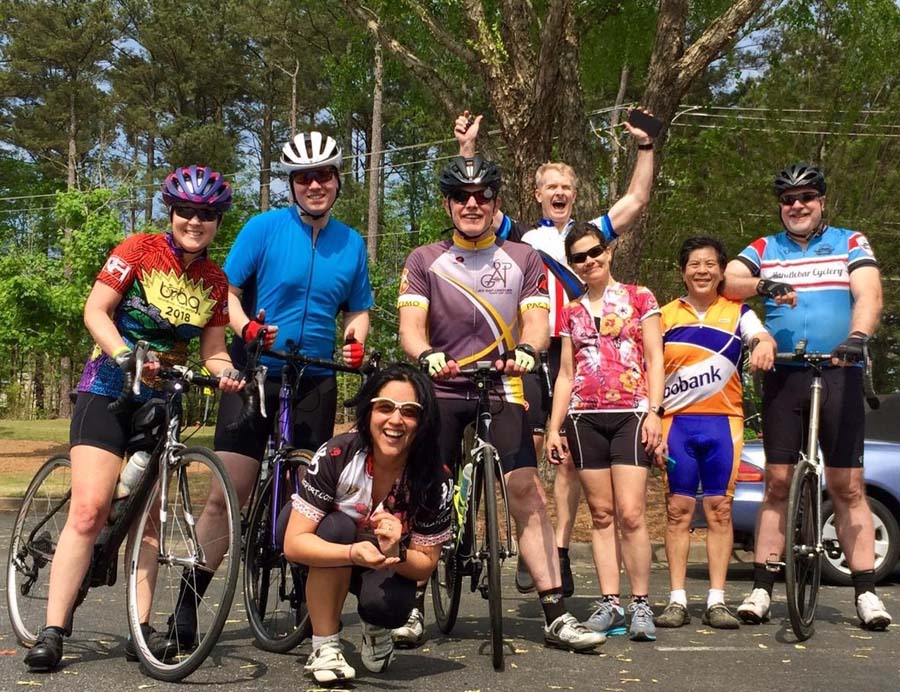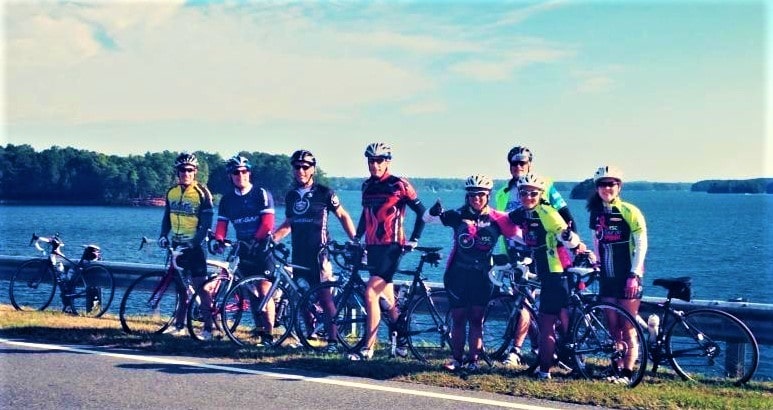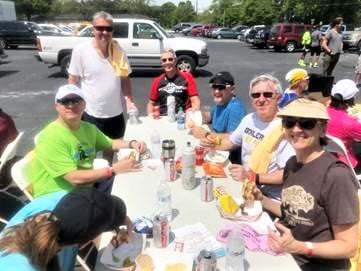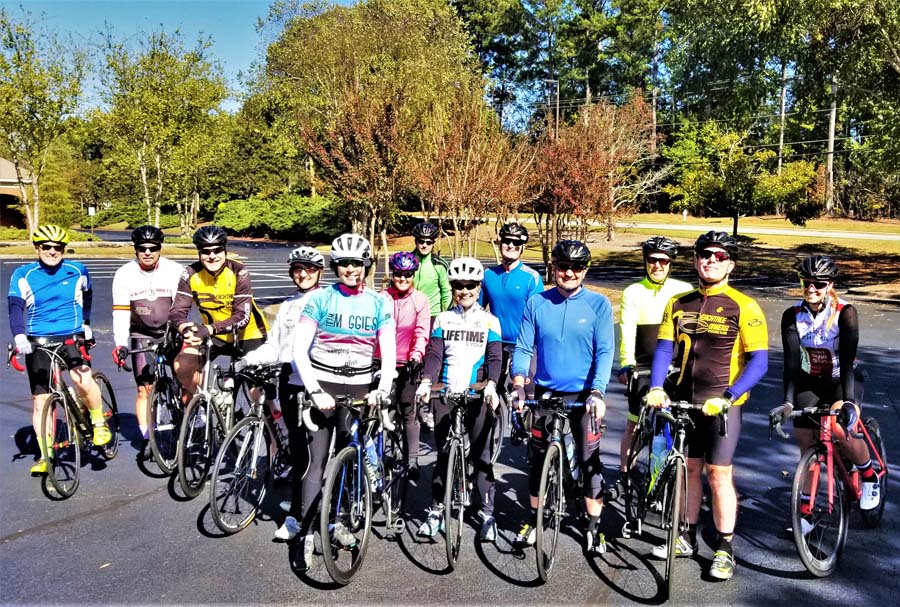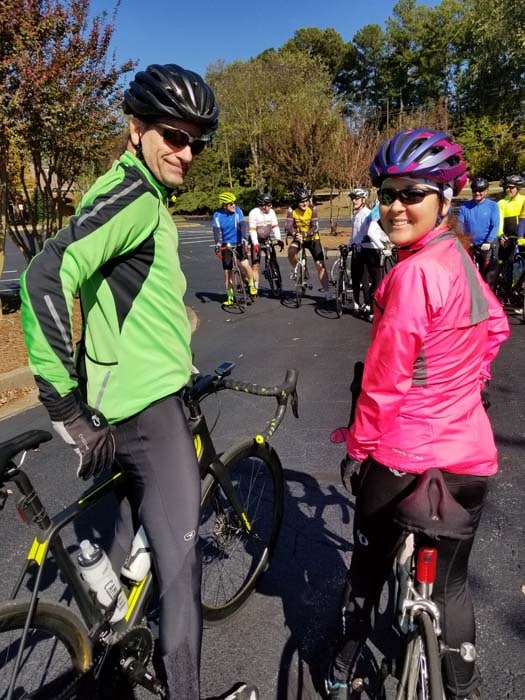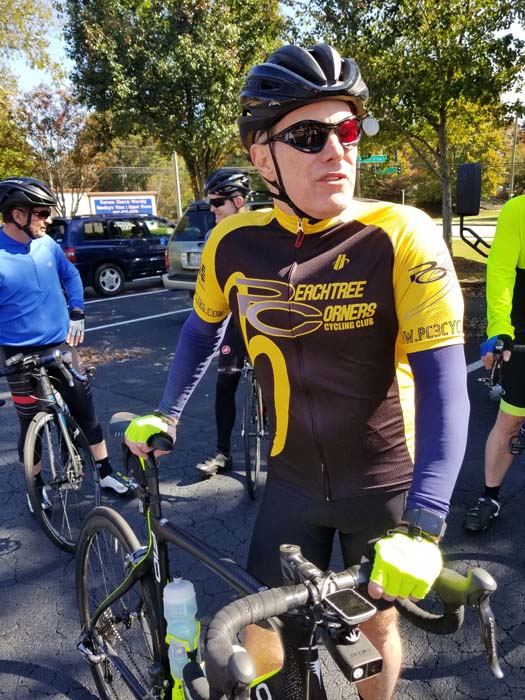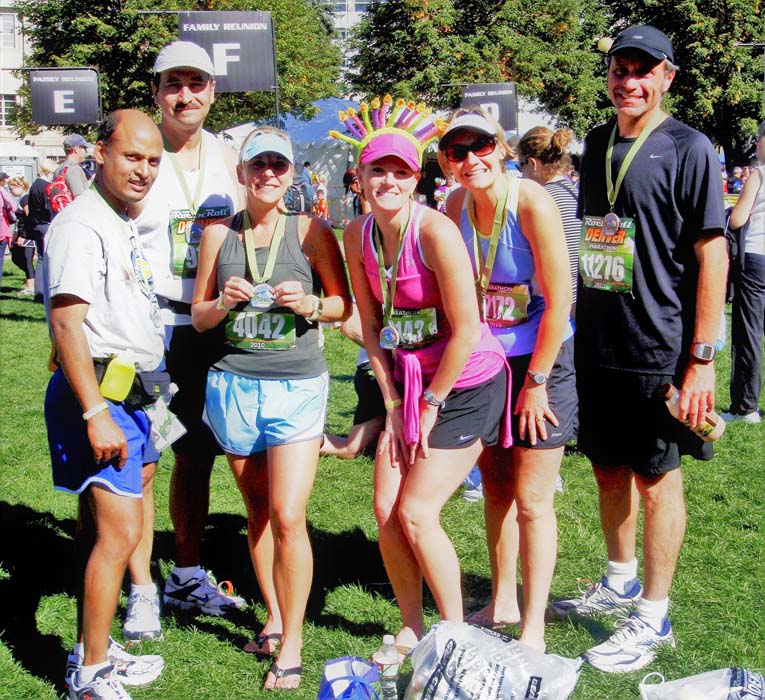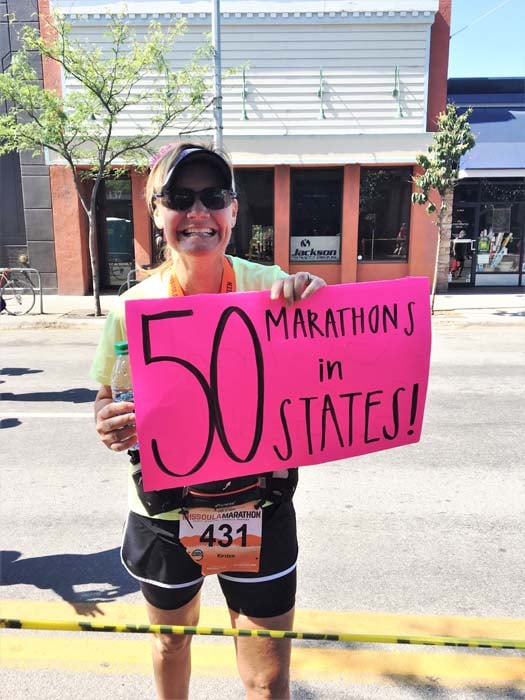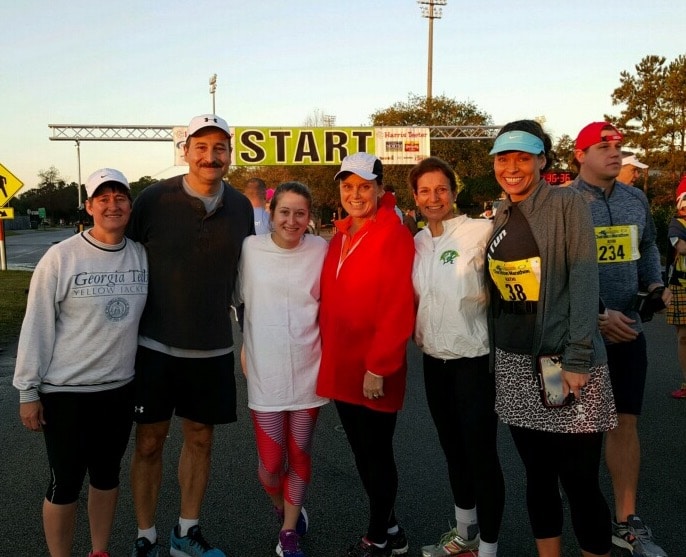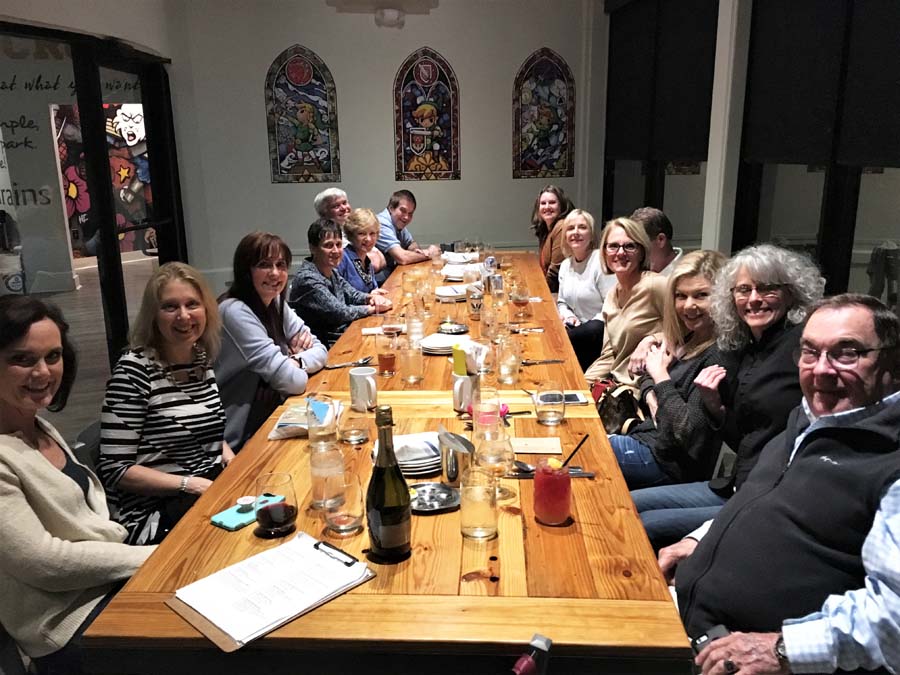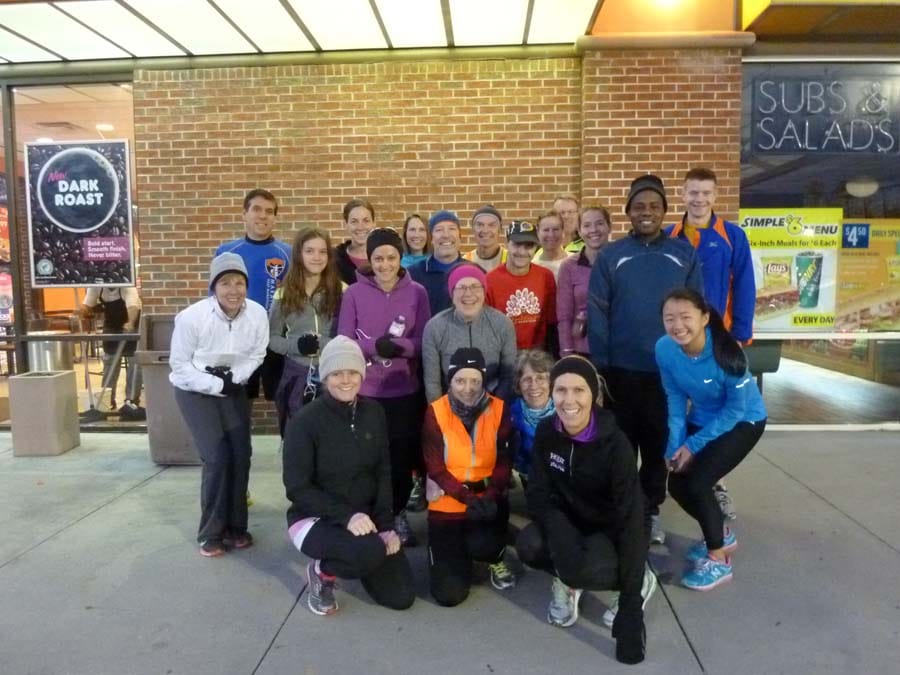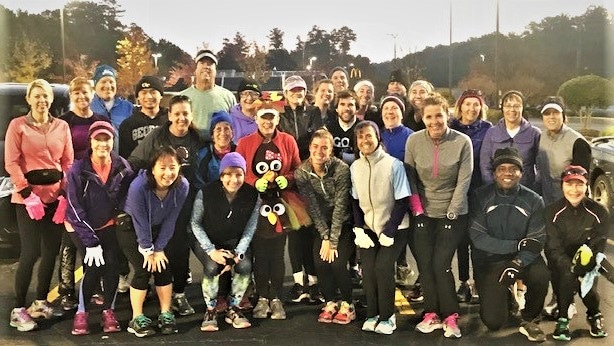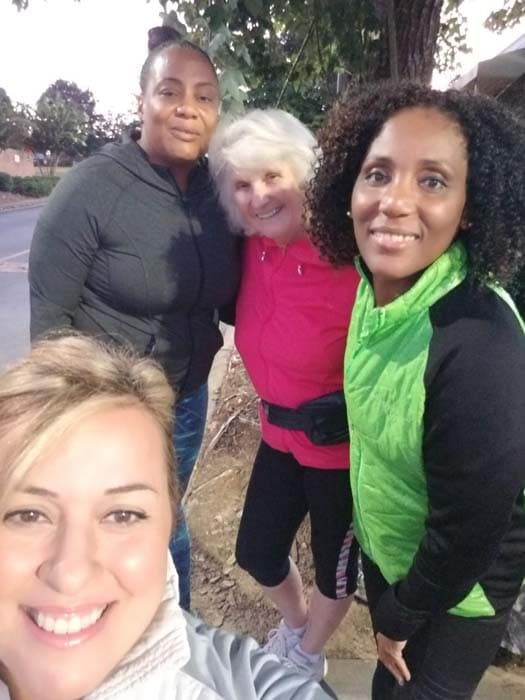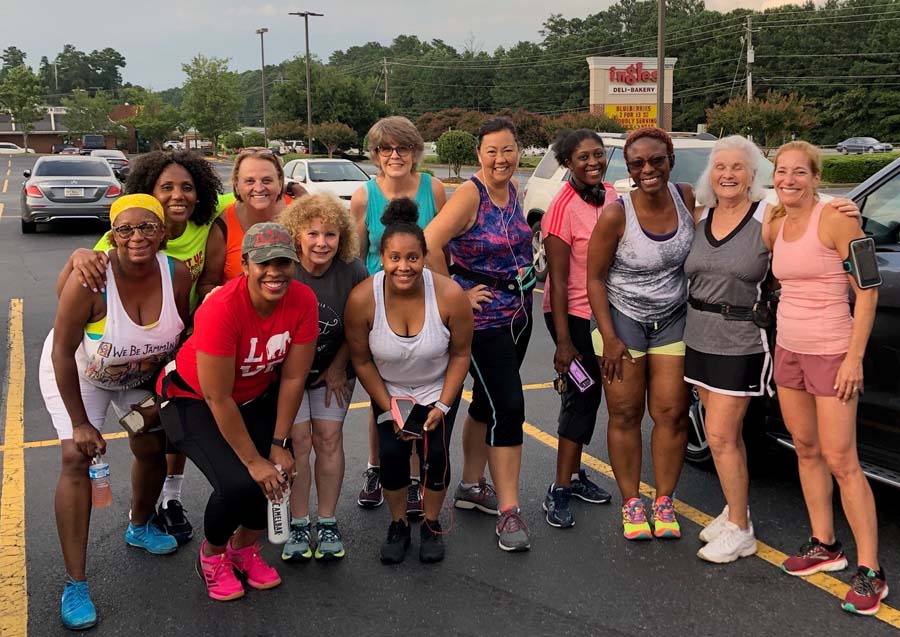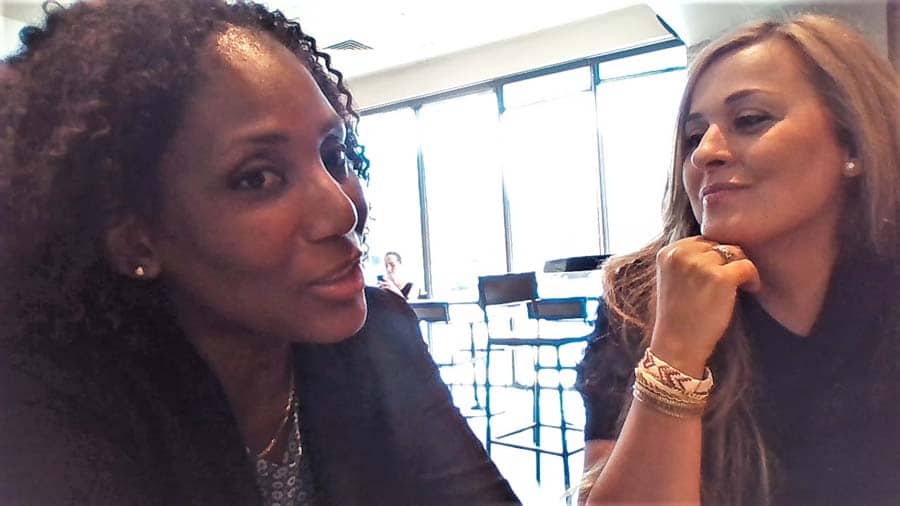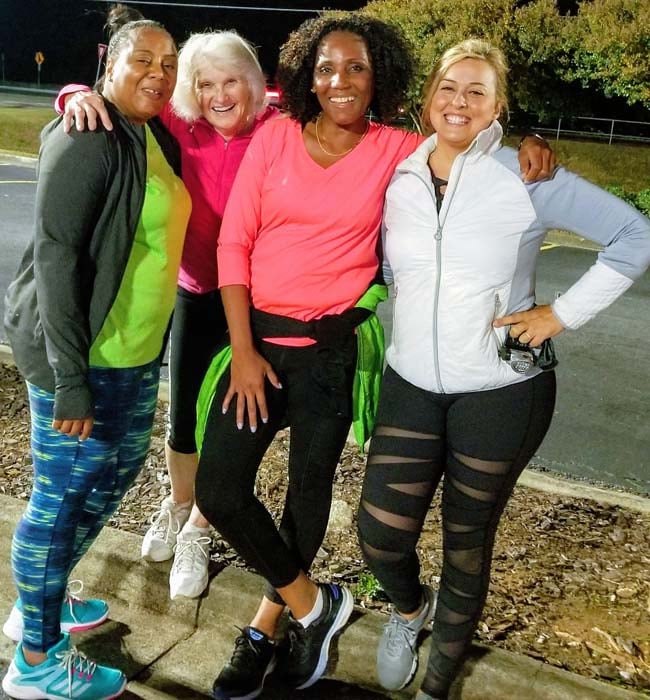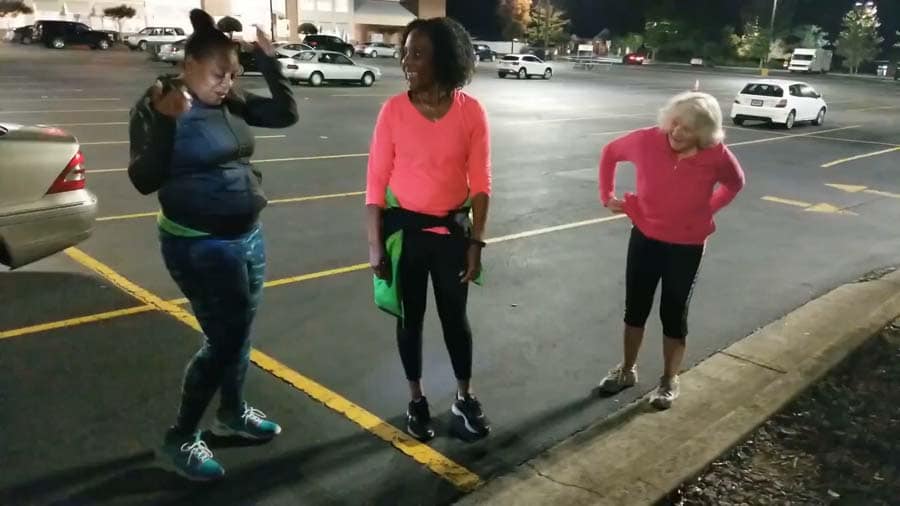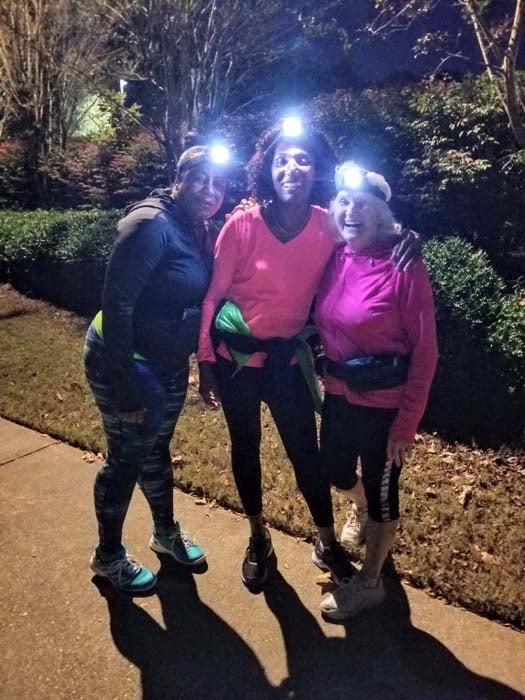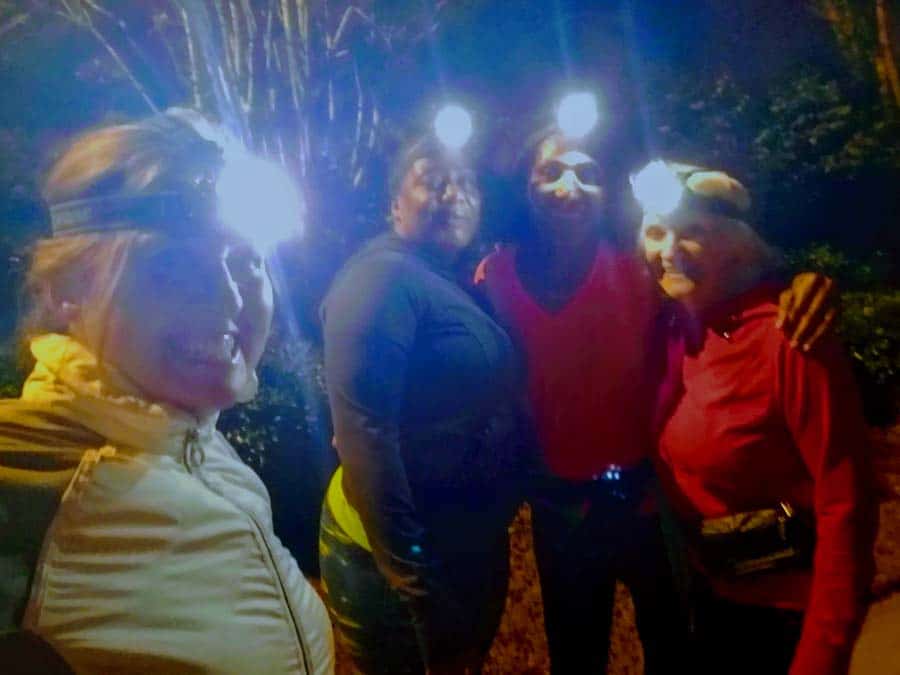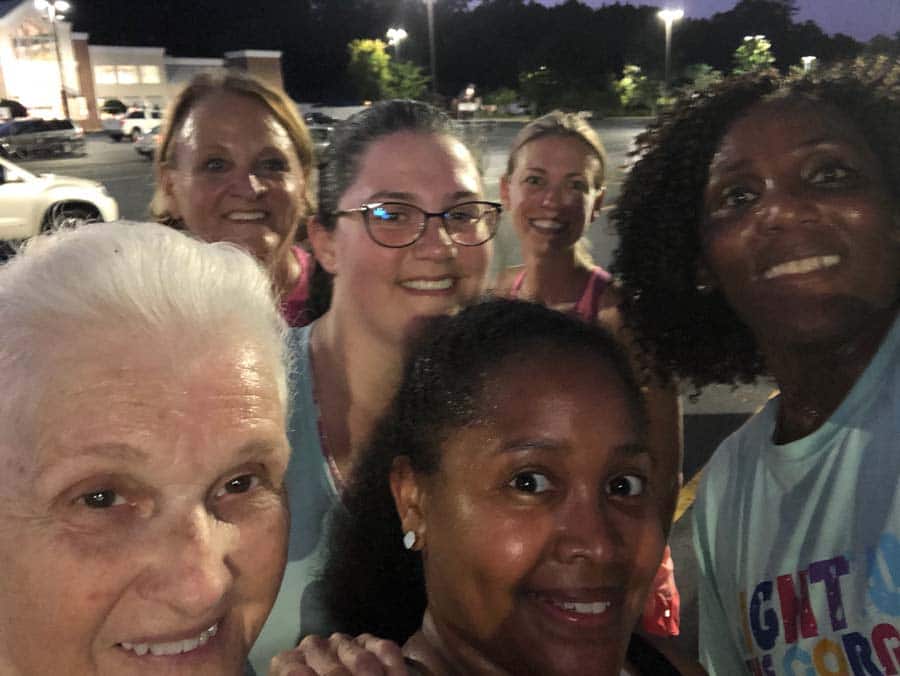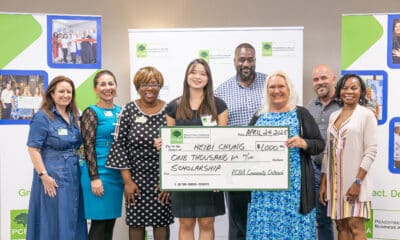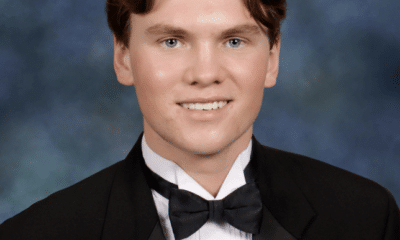Community
Exercise Groups in Peachtree Corners—Fitness & Friendships for The Win!
Published
5 years agoon
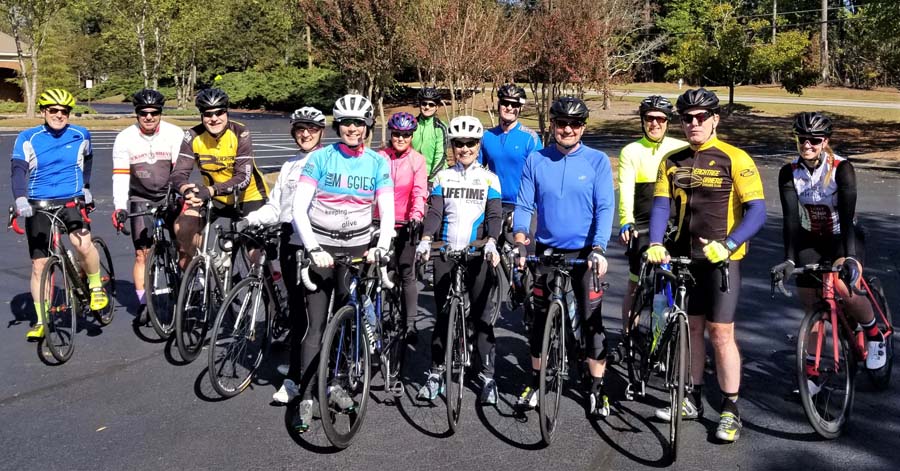
How wonderful to live in our contemporary world brimming with technological and cultural conveniences like cell phones, computers, online shopping for anything from furniture, to clothes, to daily grocery necessities. We can work from home in the comfort of our pajamas and not see a soul all day. Or we drive home from work, close our automatic garage doors behind us, and never have to see a neighbor.
Social norms for the nuclear family have shifted, and more people live alone now than ever in history. It’s not difficult to see why loneliness is more prevalent in today’s society than it has been in previous generations. Modern life is certainly conducive to isolation. We nonetheless evolved to be social beings, with meaningful human relations being as much of a need for our wellbeing as food and water.
Fortunately for us, living in Peachtree Corners with its active residents, well-maintained public spaces, infrastructure, beautiful residential areas and relatively mild weather, provides plenty of opportunities to combat the sedentary and solitary trends of today’s daily grind. Several social groups meet in our city, from those with interests in gardening to knitting to board games. I decided to investigate some active local groups and learned that for both leaders and members alike, the value of these alliances favoring connections and mutual support extends far beyond the exercise.
Loneliness is actually bad for you
Being lonely can cause health problems, shortening your lifespan. It’s not just a platitude when you hear people speaking about the importance of being healthy in mind and body.
“…[S]ocial isolation… [is] a predictor of mortality on par with smoking, obesity, elevated blood pressure, and high cholesterol… [H]ealth care providers assess[ing] isolation in their regular patient examinations, has clear potential to save, or extend, lives.” (Eric Klinenberg, PhD, American Journal of Public Health: Am J Public Health. 2016 May; 106(5): 786–787).
We’ve long been aware of the physical benefits of exercise. Yet have you ever considered that the friendships formed in exercise groups are just as important to your overall health as the exercise itself?
Fitness is not just physical
If joining a group for comradery and exercise seems intimidating, a group of two will do! A partner to keep you accountable and to be your confidant can provide the same benefits for your health.
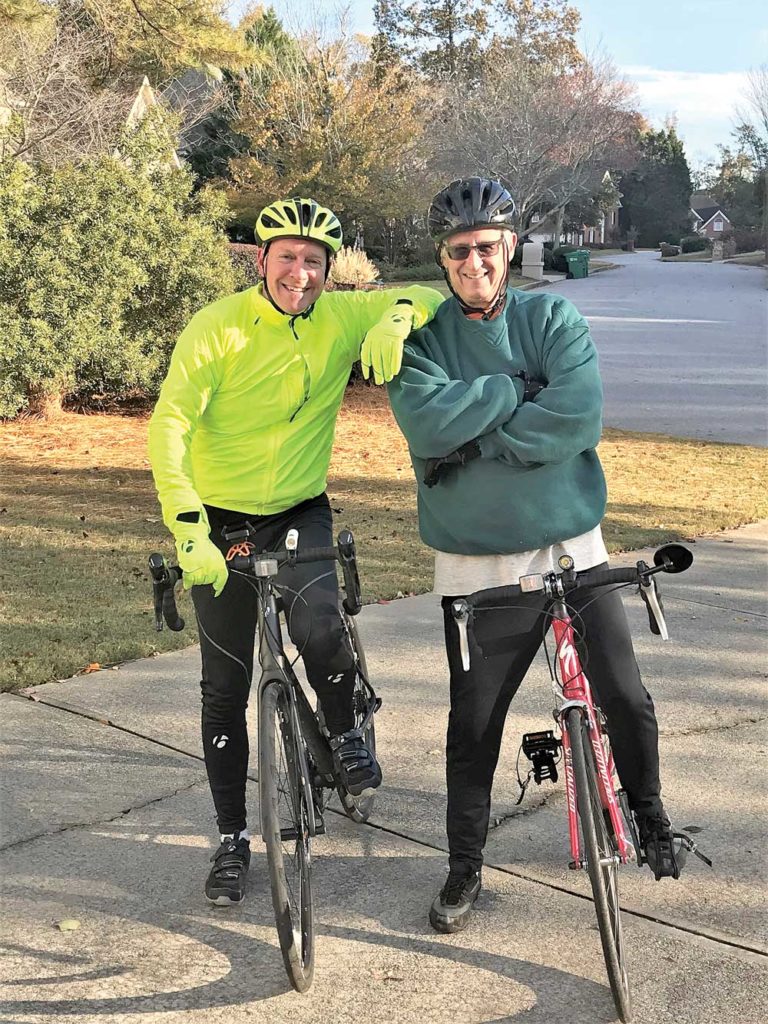
Weare Gratwick, Senior Vice President of Tandem Bank, also serves as mayor pro tem on the city council for Peachtree Corners. He likens his exercise regime three to four times a week with longtime friend, Dr. Gene Witkin, to mental health therapy.
If you live in Peachtree Corners, people walking, jogging, or cycling for fitness is not an unfamiliar sight.
“It really is great that we’ve got a community where there are so many people who are able to participate in exercise activities. They’re out and about. The city, I know, is working very hard to extend both sidewalks as well as our multi-use trails throughout the city. As we continue to expand those that’s going to provide more opportunities for people to walk, jog and ride bikes,” said Councilman Gratwick.
If you’re looking for trail ideas, scooters and bicycles are allowed on Technology Park’s Curiosity Lab, the test track for autonomous vehicles.
“That’s really the genesis of the multi-use trails because we’ve widened sidewalks to 12 feet throughout Tech Park… I know we’re working to connect to a couple of lakes back there. … You can canoe or kayak on the lakes. Our multi-use trail will… continue the loop around the city… It’s high on our priority list.”
You can find Gratwick and Witkin riding their bikes in Simpsonwood Park, which is also a great place to run and walk. They enjoy riding through neighborhoods like North Manor and Amberfield as well.
PC3 (Peachtree Corners Cycling Club)
Randy Bailey, a software sales executive and resident of Peachtree Corners since 1986, well before its incorporation as a city, heads up PC3, a diverse group of road biking enthusiasts who have been riding on Saturday and Sunday mornings, and on Tuesday and Thursday evenings since the early 1990s. He took his love for spin class, which he taught for several years, out on the road.
Andrew Hebert helps him orchestrate the club. You can find them riding with anywhere from five to 25 people. On busy days there can be 50 to 60 riders.
Andrew Hebert and Randy Bailey head-up PC3 (Peachtree Corners Cycling Club) (Photo by Patrizia Winsper) About to leave for a Saturday morning ride October 2019 (Photo by Patrizia Winsper) At Lake pretty scenery but not so clear. The Post Ride festivities are often as much fun as the ride. About to leave for a Saturday morning ride October 2019 (Photo by Patrizia Winsper) Riders meet at Peachtree Corners Baptist Church on Saturday mornings (Photo by Patrizia Winsper) Randy Bailey rounding up the PC3 Group before a Saturday morning ride (Photo by Patrizia Winsper)
The group is comprised of cyclists in their teens to those in their 70s, from a multitude of backgrounds, representing an array of professions: long-haul truckers, people in technology, teachers and doctors. It’s anchored in Peachtree Corners, but they draw members from Roswell, Dunwoody and Johns Creek. “It’s a great, central location where people can get together and ride.”
“There are tons of athletes in the group, people who do other kinds of riding, like mountain bike riding and gravel biking. We’re primarily a road biking group but we support all those other disciplines. It’s a pretty broad sport. There are some who are triathletes so they’re runners too. I’ll have people come back from a ride, put their bikes in the car and then go for a run,” explained Bailey.
Gulp… If like me, you hear that and feel leery about joining a group of hard-core athletes, PC3 is welcoming to all levels. They have some beginners, people who just came out of spin class and want to try it on the road, people who are apprehensive about it. Some, like Bailey, become cyclists because it’s more forgiving on the joints than running and impact sports.
They all coexist harmoniously, even with members on the other extreme, who are nationally recognized racers joining PC3 on their “rest days.”
“There’s quite a bit more to it than just the exercise. That’s important and it’s definitely worthwhile, but it is a lot broader than that.” Bailey conveyed the important social factor of the group. They participate in several activities outside of their shared passion for riding. Stories of great weight loss, support for members having arrived from different countries and personal growth have all come out of this band of cyclists.
It’s amazing how easy it becomes
Member Jenny Johnson shared “PC3 has been one of the biggest reasons I was able to recover so strongly from my knee replacement and the three surgeries following. … I had to start from ground zero in building strength and confidence on the bike. … PC3 was patient enough to allow me to ride, even when I was so slow and in pain those first few months … after surgery. I’ve logged over 1,600 miles on the bike since my knee replacement and all but about 100 miles of those were with PC3.
When I met with PC3 before a Saturday morning ride, member Dena Gaddie told me she was the kid no one wanted on their team because she was not in good shape. She got into cycling as an adult and has gone from being “in the absolute worst physical shape” to being “just one of the pack—good enough to hang with the group. I’m steadily improving. Now I can do 100-mile bike rides. … It’s done a world of good for my well-being, my self-esteem, my social life and my overall outlook on life.”
The importance of sharing the road
It’s sometimes a little scary to get out on the road—even in a car. Bailey said, “I can assure you we don’t want to have accidents because the car always wins. To ride with a group is a way to make it safer. It’s absolutely a way to make it more fun.”
There seems to be a little hostility on behalf of some drivers who think cyclists should ride on the sidewalk. However, bike riding on the sidewalk is actually illegal; in most cases, bikes are to be treated as motorcycles on the road.
Sadly, on September 21, 2019, member Mike Rachelson was struck and killed with 63 miles remaining in an epic adventure—he was an avid cyclist on his second to last day of a 2600+ mile journey from Canada to Mexico along the Great Divide Mountain Bike Route. PC3 will be riding in his memory on May 2, 2020, hoping to create awareness for motorists to drive safely with bikers on the road.
Bailey was lucky to survive being struck by a pick-up truck in 2015, on a ride back from Lake Lanier. He does everything he can to promote improving relations with motorists.
Bikers make themselves as visible as possible, “We light ourselves up like Christmas trees,” he chuckled. His club respects the rules of the road, just as cars should. His message to drivers is simple: “We are not the enemy. We are your friends and neighbors. My goal is not to slow you down…”
I inquired about the proper way to pass a cyclist and learned to allow for a minimum of three feet of distance between the car and the biker for safe passing. And when you see a large group of them riding in single file, know that is the safest way for them to ride. They are also allowed to ride two-abreast on the roadways.
For more information about PC3 visit pc3cycling.com.
The Renegade Runners
This is a troop of about 40 individuals who range in age from their late 30s to age 60. Primarily female, about 80%, some are stay at home moms and several are professionals: doctors, business executives, teachers, real estate agents.
Denver marathon group 10-17-10 -photo courtesy of John Fervier pictured 2nd from left Kirsten’s 50th marathon state – photo courtesy of John Fervier Charleston Half Marathon 2016 – photo courtesy of John Fevrier pictured here, 2nd from left Dining out with the running group (photo courtesy of John Fervier) Thanksgiving day run in PTC (photo courtesy of John Fervier) The Renegade Runners 2018 Thanksgiving Half Marathon (Photo courtesy of Donna Esau)
A Waffle House executive by day, John Fervier spearheads the running group he joined 15 years ago when it was still known as Gwinnett Galloway. Galloway had gotten too regimented—it’s a very formal run/walk process—so they disbanded and formed The Renegade Runners. Their apropos motto is “Do whatever the hell you want.”
They still employ the Galloway method of repeated running and walking intervals. For example, they’ll run for five minutes and walk for one. At its inception, it was primarily a marathon training group. Now it’s primarily a social group of people who like to run an array of races.
“We wanted more freedom with our training programs,” explained Fervier. They meet on Saturday mornings at the Ingles parking lot; 7 a.m. in the summer and 7:30 a.m. in the winter.
There are different subgroups based on pace.
- The Slackers: 2:1 (They run for two minutes and walk for one.)
- The Renegades: 5:1
- Lazy Sux: 7:1. They’re the fastest and they participate in a lot of races.
Some are not training for anything. Some have run over 50 marathons, one in each state. Others are striving to accomplish that goal.
“There is nothing strict about us. We’re a social group that likes to run, or a running group with a drinking problem. We’ve been known to have some mimosas after a run,” Fervier said.
Easily equipped
Minimal gear is required to be a runner. For the proper shoes, Fervier recommends going to Fleet Feet, Big Peach or the new Peachtree Corners store, Road Runner Sports.
“It’s imperative to go to a running store to be fitted with the proper shoes. Shoe selection is based on your running style, body type, weight and the way your foot strikes the ground. Shoes are the most important piece of equipment. They should be replaced every 300 to 400 miles. My shoes will last me half a year. You’re probably going to spend $80 to $140 on a good pair of shoes.”
Fervier also suggests Body Glide, a substance you use on parts of your body that might chafe, to help keep you from blistering. It looks like a deodorant.
Running in Peachtree Corners
Fervier and his group can be seen running on the streets and sidewalks in neighborhoods like Amberfield. In the summer, they may run along the shaded path by the river in Roswell.
They’ve developed 50 different routes over the years, running primarily around Peachtree Corners. They’ll also dart to downtown Norcross and back or up to North Berkley Lake.
A member since 2006, Donna Esau shared how they’ve named and memorized all the routes since they’ve jogged them so often. There’s the “Old Lisa,” “The Infinity,” “The Donut,” and “Three Friends,” to name a few.
Fervier sends an email every weekend containing route, start time and weather information. Routes may differ depending upon which races they’re training for.
“There are great areas for running around here with little traffic. We have hills instead of just straightaways, which helps a lot with training. It’s pretty much a perfect place. And there are great restaurants to go to for breakfast afterwards,” Fervier said.
Running buddies
“You have people who have been running together for more than 10 years. I might be out there for 4 to 5 hours at a time training, so you get to know these people very, very well. You become good friends. When you’re running with somebody for so long, you call him your running husband,” said Esau.
“We’ve all become really close friends. We’ve traveled across the country together running races. We’ve traveled to California, to Hawaii. We have Christmas parties, we celebrate together, and we support each other when we’re going through difficult times,” Fervier explained.
“Typically, our Saturday runs last one to two hours,” he continued. “When you spend five to six hours running with people—training for marathons, we run 20 miles or more—or several hours on the road heading to different marathons, you learn a lot about them.”
Fervier knows of some relationships that sprang from the group. He also described how members can count on one another when dealing with illnesses or during difficult times at home. “You learn a lot about their personal lives and what they go through. When I’ve had my own illnesses, I’ve leaned on my friends in the running group to help me through it,” he said.
To show their support when a member is preparing for longer marathons, some people in the group will run the first 10 miles with him or her, then another set of people will go along for support on the next 10.
“We like people that get along with other people. Those are the people who stay with our group and enjoy it. No drama, no fighting,” said Fervier.
Running is a stress buster
Referring to marathons, during which one person may run for three to six and a half hours, Fervier considers running a great, stress-relieving exercise, “almost like going on a long drive in your car. You remember the beginning and the end of the drive; in the middle you zone out.”
I gasped at the thought of running for 26+ miles, to which Fervier responded, “You get used to it; you’d be amazed. When I first started, I would run one mile and that’s it. Your body gets so accustomed to it. It doesn’t affect you anymore.”
Holiday cheer
Esau described the annual Half Marathon put on by member Rebecca McLaughlin and her husband. “They organize a Thanksgiving Half Marathon every year. They provide refreshments, they cheer people on, they drive the course to make sure people are safe. It doesn’t cost you anything. Unless you want a medal. She’ll order one for you. There is nothing competitive about this group! She also puts on a Christmas run.”
Runners can bring their children, and it’s a fun, relaxing way to burn off some calories from the fabulous feasts.
BGR (Black Girls Run)
I met with Director of Research/Electrical Engineer and BGR lead Prudence Franklin, who explained that there are BGR groups across the country trying to encourage women of all fitness levels to get out and become more active.
1 Before the Run – Oct 2019 (Photo by Patrizia Winsper) BGR picture by Prudence Franklin Interview with Prudence Franklin, Lead of Black Girls Run (Photo by Patrizia Winsper)
While there were BGR groups in Atlanta, there wasn’t one in Peachtree Corners, so Franklin decided to get a team of women together of varying sizes, shapes and capabilities. She posted an ad on the Nextdoor website and women from all over Peachtree Corners, Berkley Lake and Johns Creek answered the call.
BGR meets three days a week on Mondays, Wednesdays and Saturdays. Mondays and Wednesdays at 7:30 p.m. in the summer and 7 p.m. in the winter. Saturdays at 7 a.m. “We try to get out there and do our thing,” said Franklin.
Since August of this year, 30 women inquired about BGR. Initially, 12-14 came out to participate. Now there are about four or five regulars. “We meet at the Dunkin Donuts in the Ingles Plaza,” Franklin said.
Their ages range from late 20s to 70s and all levels are welcome: some are runners, some prefer to walk and others run/walk. Despite the group’s name, Franklin stressed that women of all ethnicities are welcome to join them. Just as Peachtree Corners is diverse, so too is their BGR group.
While the origin of the movement was meant to help improve the health of African American women who statistically have had higher rates of hypertension, diabetes and heart disease, it’s not exclusively for black women. It’s about empowering all women to be healthy. “We want all women out there running and being health-conscious,” said Franklin.
At your own pace—in company
I joined the ladies one evening on a run to Simpsonwood Elementary and back to Ingles. Initially, I feared my speed would not be up to par. I met members Corinda Billington and Tavia Anderson that night. Billington is 70 and in much better shape than I am. She also plays tennis on two different teams. She links up with BGR often and said she enjoys the workout and company since having lost her husband.
It was a relief when Franklin explained, “The whole point of BGR is so women would not be intimidated. The walkers walk with each other, the runners run together and we have the motto: No woman left behind.”
In the end, the runners get back first and they wait for the walkers. Everyone waits until the last people come in. I can attest to this, as on the night I joined them, Franklin could clearly run circles around the rest of us, but she gracefully fell back, doubled-back, checked on us and brought us headlamps for running at night, likely going three or four times the intended distance.
“It’s a running club but we have walkers, run/walkers and runners. We wait for and celebrate everyone upon their return,” said Franklin.
When I thanked her for her efforts and for the great things she’s doing in our city, Franklin replied, “This is Peachtree Corners, we have to keep it vibrant, alive and a good place to live.” Indeed.
Stay tuned for our December podcast on Exercise Groups in Peachtree Corners!
Related
Patrizia hails from Toronto, Canada where she earned an Honors B.A. in French and Italian studies at York University, and a B.Ed. at the University of Toronto. This trilingual former French teacher has called Georgia home since 1998. She and her family have enjoyed living, working and playing in Peachtree Corners since 2013.

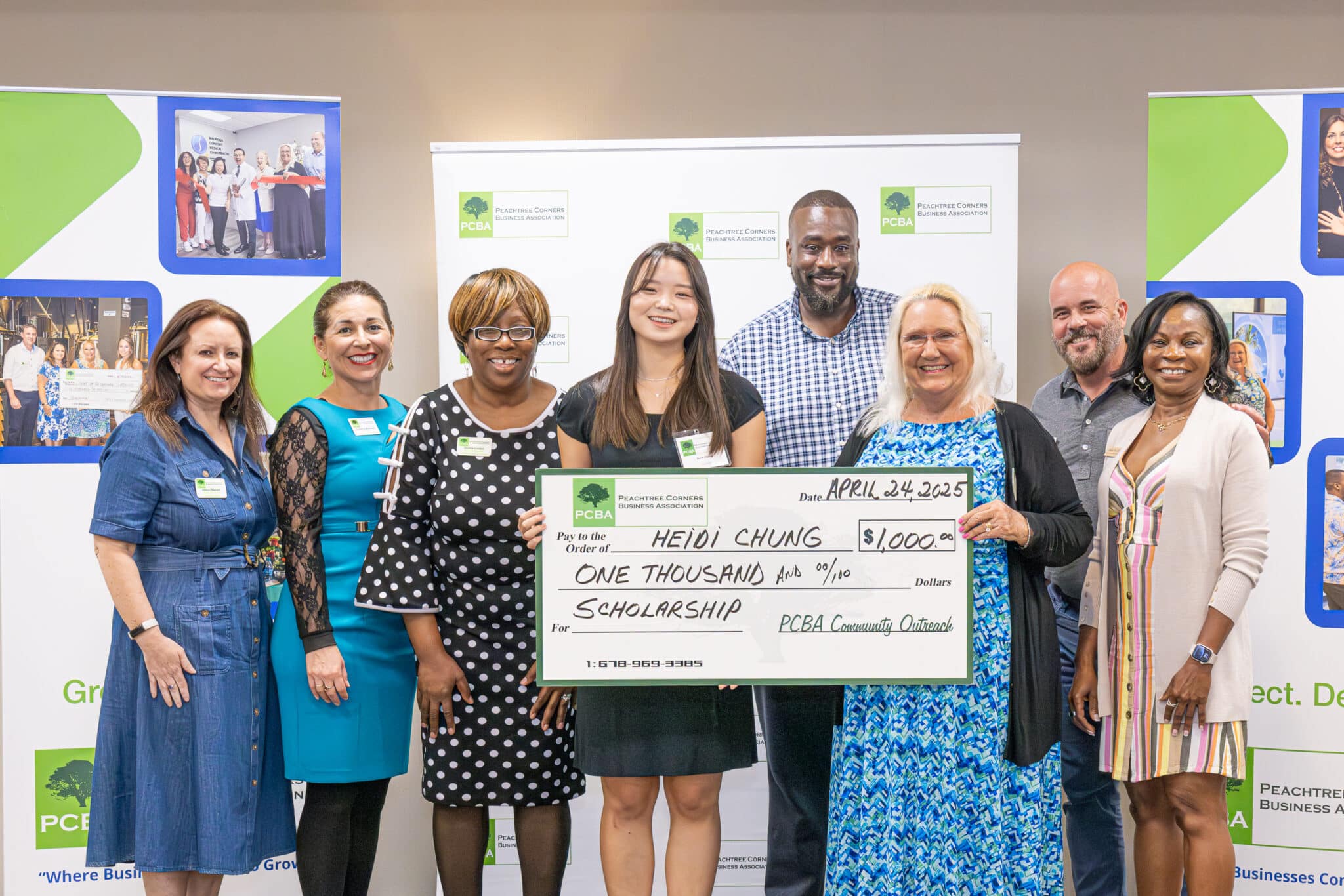
The Peachtree Corners Business Association (PCBA) awarded local high school senior, Heidi Chung, a $1,000 scholarship during their April 24 Business After Hours event. Heidi and her family were presented with the scholarship and introduced to the organization’s members and guests at the monthly gathering.
Heidi was accepted by several colleges and has selected the University of Kentucky to continue her education, pursuing a degree in nursing. When asked what lessons she has learned from her experiences volunteering and serving in the community throughout her life, Heidi commented, “I have learned that true leadership is about service, taking initiative and persevering through challenges.”
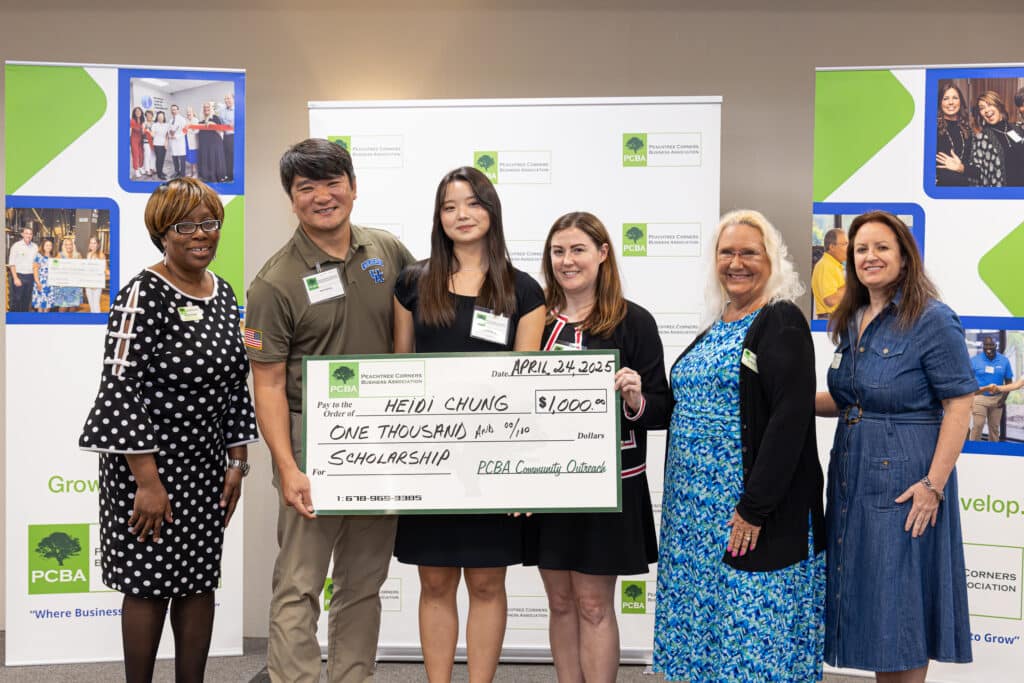
Scholarship Chair Donna Linden and Outreach Director Suzanna Martinez shared that the scholarship committee was impressed with Heidi’s many accomplishments, “whether she was organizing fundraisers, leading performance groups or helping athletes recover from injuries, Heidi demonstrated a positive impact on the community, as well as outstanding academic results.”
Funds for the PCBA Community Outreach Program are raised throughout the year from PCBA membership, sponsorship and an annual charity event. Donations and scholarships are awarded at PCBA’s monthly events so that members have the opportunity to learn more about the individuals and organizations.
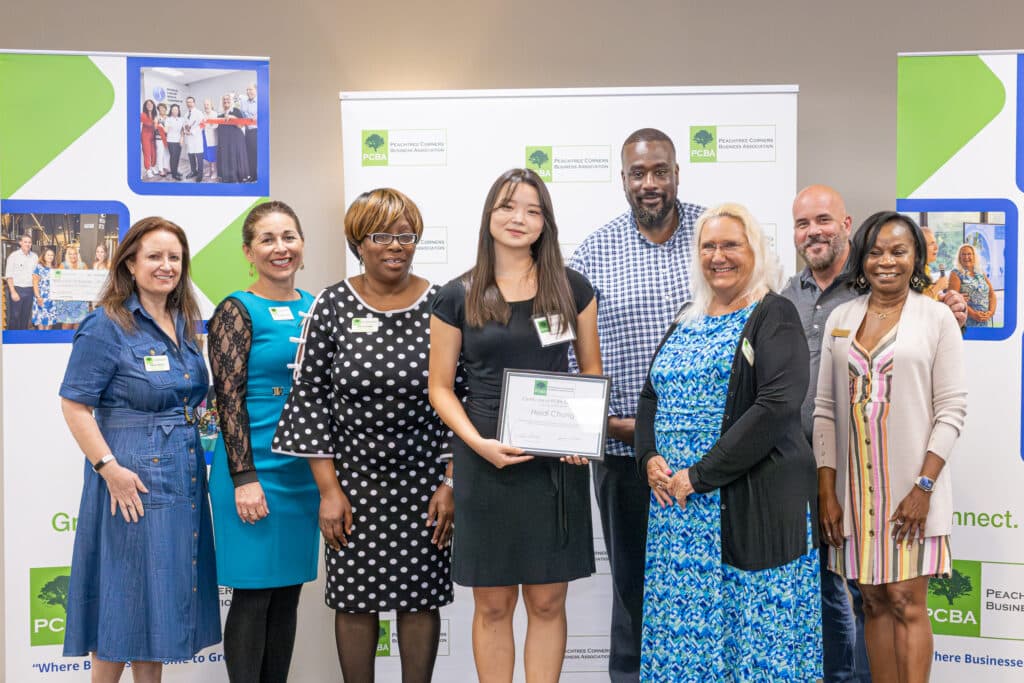
“We are so proud that the PCBA has … awarded 20 scholarships to outstanding future business leaders and donated in excess of $173,000 into our metro Atlanta community over the last 13 years,” stated Lisa Proctor, PCBA board president.
About Peachtree Corners Business Association
“Where Businesses Come to Grow,” the Peachtree Corners Business Association is a business membership organization that focuses on innovative approaches, programs, shared resources, community outreach and opportunities for member businesses and professionals to connect, develop, grow and prosper.
The PCBA is made up of businesses of all sizes and types who want to expand their reach and grow their business within Peachtree Corners and the greater metro Atlanta area.
For more information, call 678-969-3385, email membership@peachtreecornersba.com or visit peachtreecornersba.com.
Related
Community
Katherine Lafourcade — A Journey of Passion, Resilience and Giving Back
Published
5 days agoon
April 29, 2025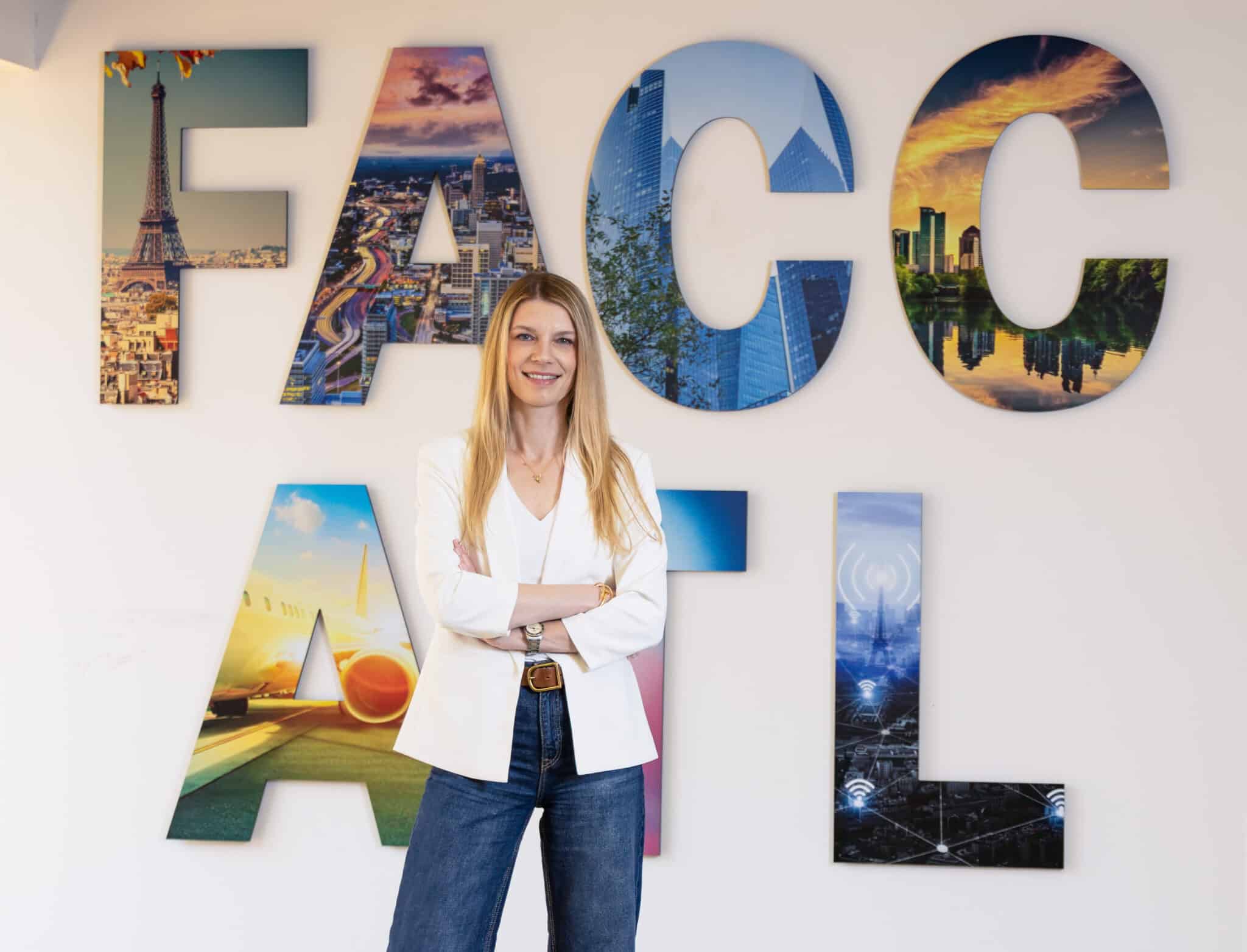
Katherine Lafourcade, executive director of the French American Chamber of Commerce Atlanta-Southeast (FAAC Atlanta-Southeast), located at Curiosity Lab Peachtree Corners, discovered her passion for French early in life.
As a schoolgirl in England, learning French ignited a spark in her. And by age 13 she’d informed her mother that she planned to be bilingual, live in France and marry a Frenchman. Later, armed with a degree in international business and French, she made her way to an internship in Paris, achieved fluency and did, in fact, eventually marry a Frenchman.
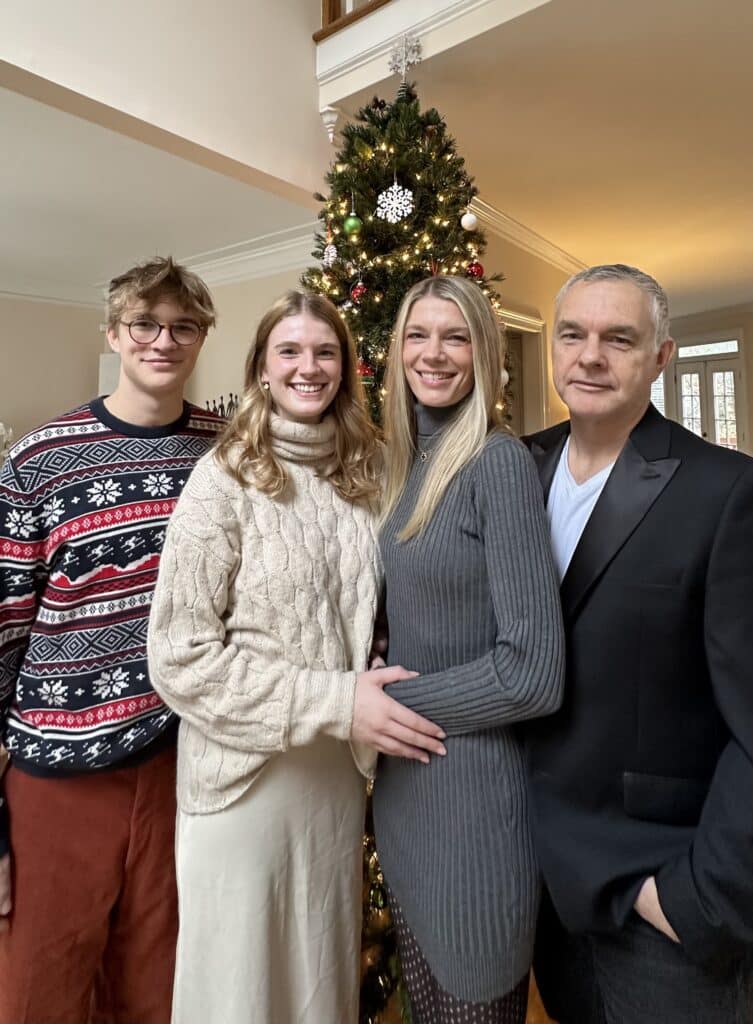
“I worked for 10 months in Paris for a defense company … in the purchasing department. I was basically learning French. I was an assistant, and it was very much French immersion,” Lafourcade recounts.
Having reached an important linguistic milestone, Lafourcade couldn’t wait to share the progress with her mother. “I rang her so excited one day, forgetting she was still teaching. […] They had to get her out of the classroom to come to the phone. All I wanted to tell her was that I’d had a dream in French,” she laughed.
Career moves and motherhood
Lafourcade held various jobs in Paris, then moved to Nantes on the west coast before a new opportunity led her to Geneva. She’d spend more than 15 years in Switzerland. It was there that she met Alain, her Frenchman, and had two children, Lina and Theo.
Balancing motherhood and a career was important to Lafourcade. While initially staying home with her young children, she soon sought a professional outlet.
“For me it was important to show my kids that mums are able to work and have professional roles,” she stated.
Entrepreneur
As women so often do, Lafourcade adapted to meet her family’s needs, but being a stay-at-home mom was not her long-term plan. “I did struggle at that point. […] It was difficult. […],” she confessed.
To work around their circumstances with young children, she and her British biochemist friend co-founded a French/English bilingual preschool, allowing for a business to flourish alongside their children.
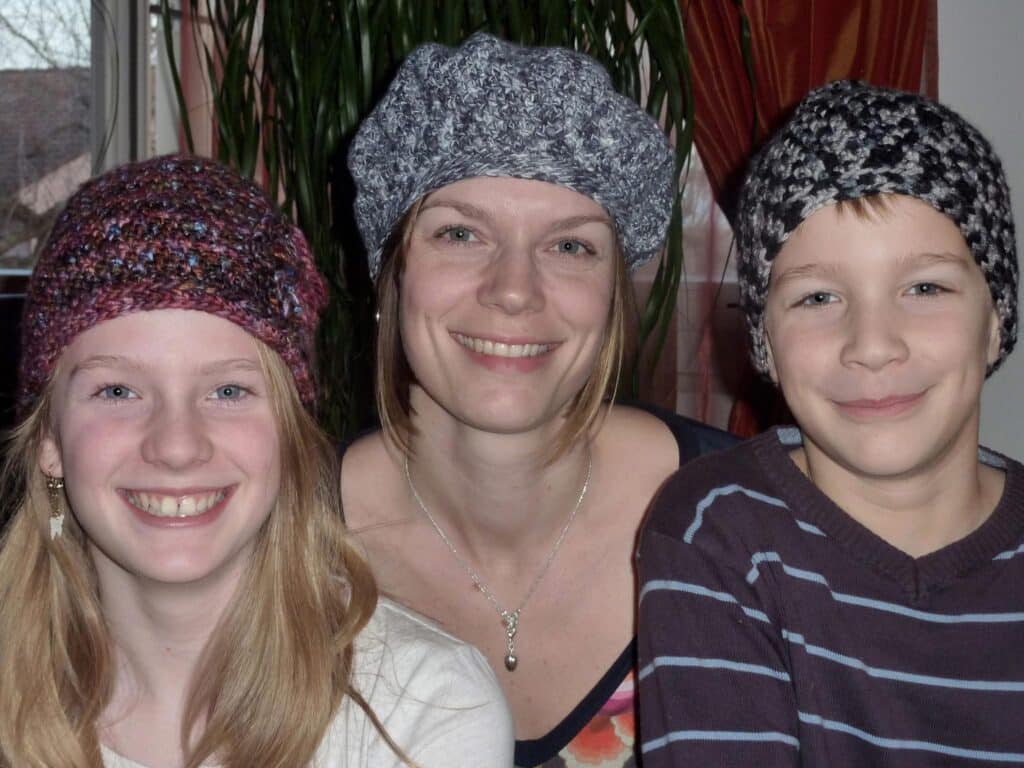
Naysayers suggesting they shouldn’t embark on this venture because they were women, mothers and expats only strengthened their resolve. They ran the successful business for five years, allowing their children to thrive with friends in a nurturing environment.
They secured an employee with early childhood education qualifications. Her friend oversaw the books and finances, and Lafourcade spearheaded communications.
“We were everything — the CEOs and the cleaners,” Lafourcade chuckled.
Once their children were older, the business was sold. Lafourcade then held jobs in recruitment, education (as administrative staff) and manufacturing. Her last job in Switzerland was with Nestlé for five years, serving as an executive assistant to the vice president of Nestlé Skin Health.
As varied as her roles have been, they share a common thread. “In all of my jobs, I’ve always found something where I can use both languages,” she said.
Disaster strikes
In December of 2016, 12-year-old Theo started getting sick. What began with mysterious symptoms like leg and chest pains increased in intensity to the point of tearful nights that landed him in the hospital with a low-grade fever during the family’s trip to the UK in early 2017.
“I’m sure he’ll be fine,” Lafourcade told herself as she spent a milestone birthday in the hospital while Theo underwent a battery of tests. In the meantime, Alain and Lina returned to Switzerland. Lafourcade and Theo stayed behind, hoping for answers that never came.
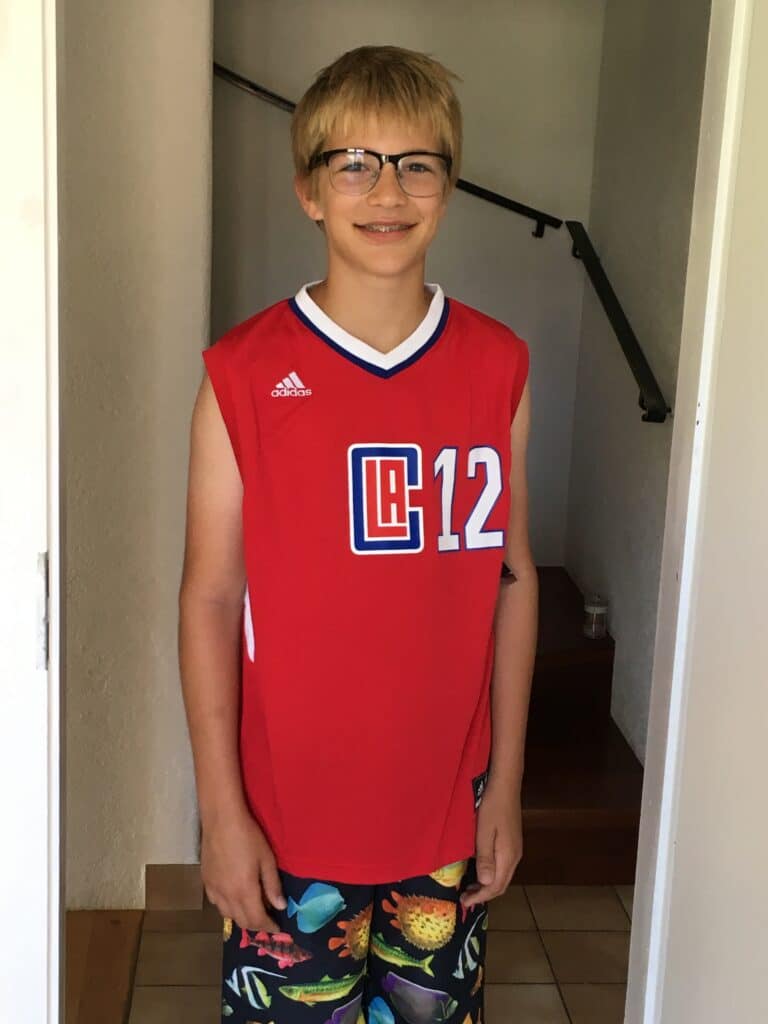
Ultimately, the decision was made to forward all lab results to Theo’s doctor in Switzerland and return home for further investigation. Lafourcade’s sister, a medical professional, reviewed the labs and harbored concerns.
Amidst uncertainty, Lafourcade took Theo, unwell and tired of being poked and prodded, to the pediatrician upon their return.
After cautioning everyone to remain calm, the doctor’s demeanor changed upon feeling Theo’s enlarged spleen, sending them to the hospital immediately.
It’s leukemia
Reliving the trauma, Lafourcade felt the emotions of Friday, January 13, 2017, surface. The diagnosis was acute lymphoblastic leukemia (ALL). Chemotherapy treatments began that same day.
“You don’t get the words that are being said,” Lafourcade confided. “It feels absolutely impossible. This is your healthy, happy, normal kid. How have we gone from that to cancer?”
The port placed in Theo’s chest remained there for the duration of his grueling treatment protocol — over three and a half years.
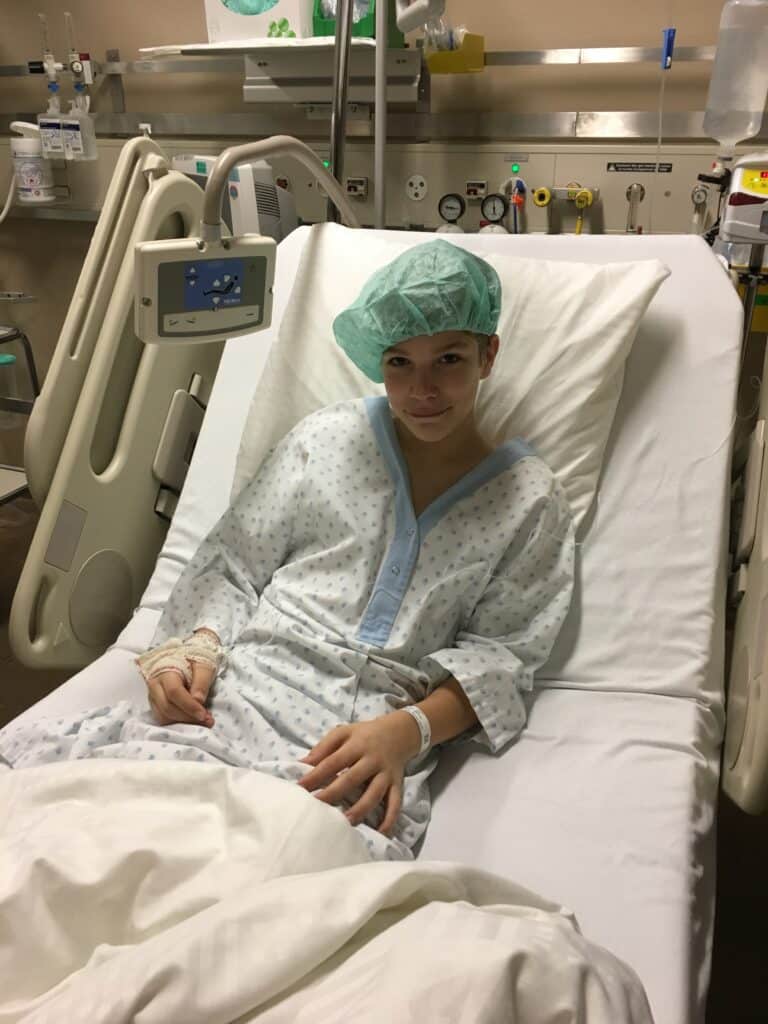
“Leukemia is tough. You learn a lot very quickly because you’re kind of put on this crazy train going 100 miles an hour,” Lafourcade shared.
Leukemia originates in the bone marrow where a single white blood cell undergoes a mutation and multiplies, triggering abnormal growth and division. The proliferation of abnormal cells crowds out healthy white and red blood cells and platelets.
Lafourcade explained, “Normally white cells defend the body. They’re part of your immune system. Once they’ve mutated, they don’t defend anything. They multiply much too fast, and they don’t die quickly enough.”
Phase one
It was the buildup of leukemia cells within Theo’s bones, especially large bones like the sternum and femur, which created massive pressure and pain. Chemotherapy alleviated his discomfort. However, this intensive phase of treatment made school difficult and brought with it all the usual side effects: hair loss, nausea and lethargy.
Lafourcade speaks highly of the care Theo received at the CHUV: Centre Hospitalier Universitaire Vaudois. There, a cocktail of drugs was administered one to four times weekly; some administered into the port, some in a 24-hour drip requiring overnight stays. Others required days of saline pre- and post-hydration to avoid an assault on his organs.
As for Theo’s mood, Lafourcade recalls when he’d had enough. “You have to imagine a 12 and a half, 13-year-old. […] At one point he told me he wanted to die. He said, ‘I don’t want to do this anymore.’ It was horrendous for all of us.”
Constantly in and out of the hospital, Lafourcade was unable to work. Her team at Nestlé took on her workload and checked on her regularly.
When the easy part is hard
Nine months into Theo’s relentless treatment, the Lafourcades anticipated the simpler “maintenance” phase, but things unfortunately took a turn for the worse. Frantic testing revealed an intestinal parasite wreaking havoc on Theo’s already weakened immune system.
There was no rest for mother or son. Lafourcade logged each time he vomited or went to the bathroom — up to 15 times per night. Theo was in agony. When the infection spread to his bloodstream, septicemia took hold. His blood pressure was crashing.
“His lungs got the majority of the infection, so there was not enough oxygen getting from his lungs into his blood system,” Lafourcade explained.
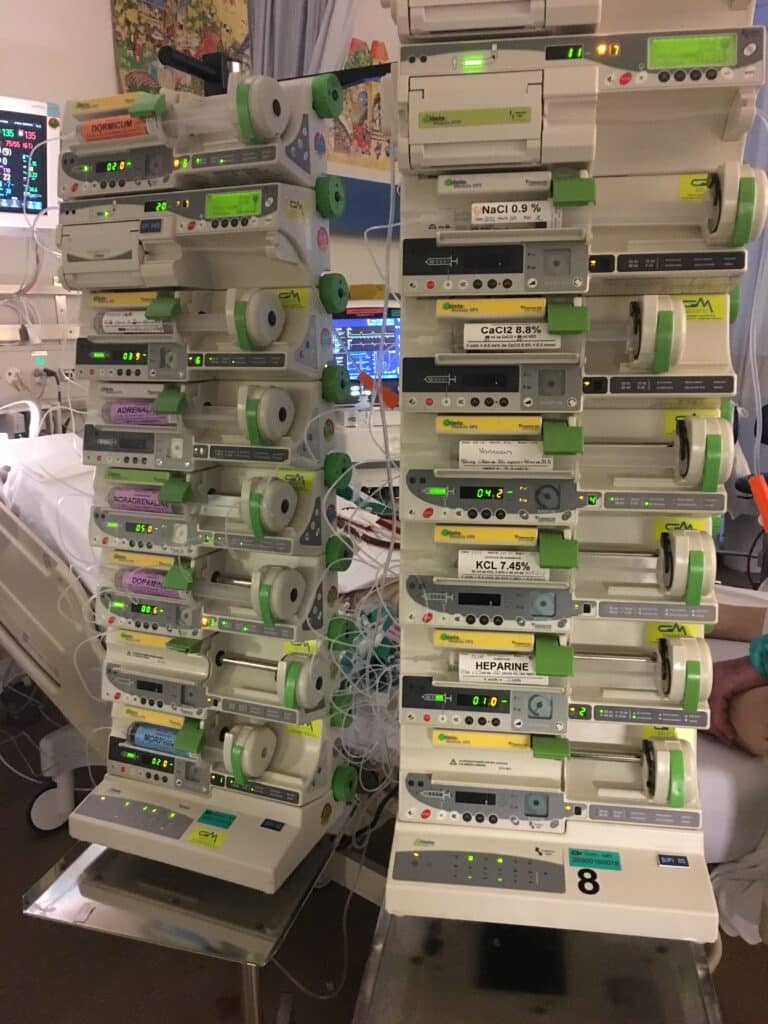
In coma
As a last resort, Theo was placed in a coma and put on extracorporeal membrane oxygenation (ECMO) life support. Mimicking the functions of the heart and lungs, the machine adds oxygen to and removes carbon dioxide from the blood outside of the body and then sends it back into circulation.
“It’s brutal. It’s like open heart surgery. You put two tubes directly onto the heart,” Lafourcade said. At the same time, Theo was on a ventilator for breathing, on dialysis for his failing kidneys and had a tracheotomy to prevent damage to his vocal cords due to extended intubation.
“The machine kept him alive for over three weeks, […] Normally people don’t go on that machine for long because the body is only able to cope with the blood going through this kind of machinery for a short period of time.”
In fact, Theo hemorrhaged multiple times. He needed more blood, fast. Lafourcade recalls doctors sounding an alarm while yelling, “He is empty!” Then she watched as large syringes of blood were injected into tubes connected to his body to boost his blood volume.
A mother’s voice
Having heard that maternal voices can comfort patients and improve their condition, Lafourcade sat by Theo’s side reading to him for the better part of three weeks.
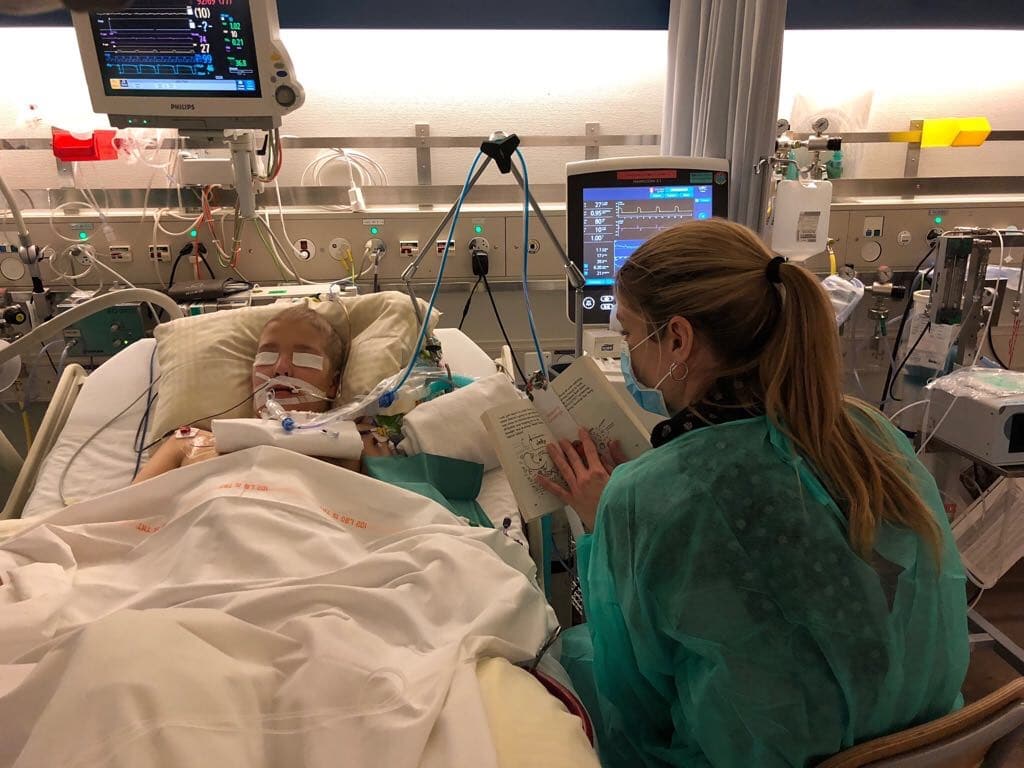
During times when Theo seemed to be “closer to the surface,” his heartrate increased and he exhibited twitching or facial movements. As Lafourcade read to him, she noticed that his agitation would subside.
A rude but astonishing awakening
It was a harrowing decision to take Theo off life support in January. Doctors weren’t sure his heart and lungs could withstand it. He bled profusely, requiring another blood transfusion, but miraculously, he made it.
After nine months of feeling terrible from chemotherapy and being assured it would get easier, he was angry when he woke up. Things were not better.
He’d lost so much muscle mass he could barely sit up. His body was riddled with pressure sores from having been immobile. “He was a little skeleton who couldn’t speak because of the tracheotomy. He was furious. All I could see was this fist by the side of his bed,” Lafourcade recalled.
It took months of daily physiotherapy for Theo to relearn how to sit, stand, walk and grip a pencil.
Coming to America
Just as Theo was transitioning out of the ICU, Alain was offered a position abroad.
“We both said, ‘This feels like something we should look at,’” Lafourcade said. They discussed it with Theo’s doctors first.
They learned that the treatment protocol for leukemia in the U.S. is identical to that of Switzerland. Moreover, his doctors felt the move would benefit Theo psychologically.
The next step was talk to their kids. “I hadn’t even finished my sentence when I was asking Theo, who was 15 at this point and he said, ‘I want to go tomorrow.’”
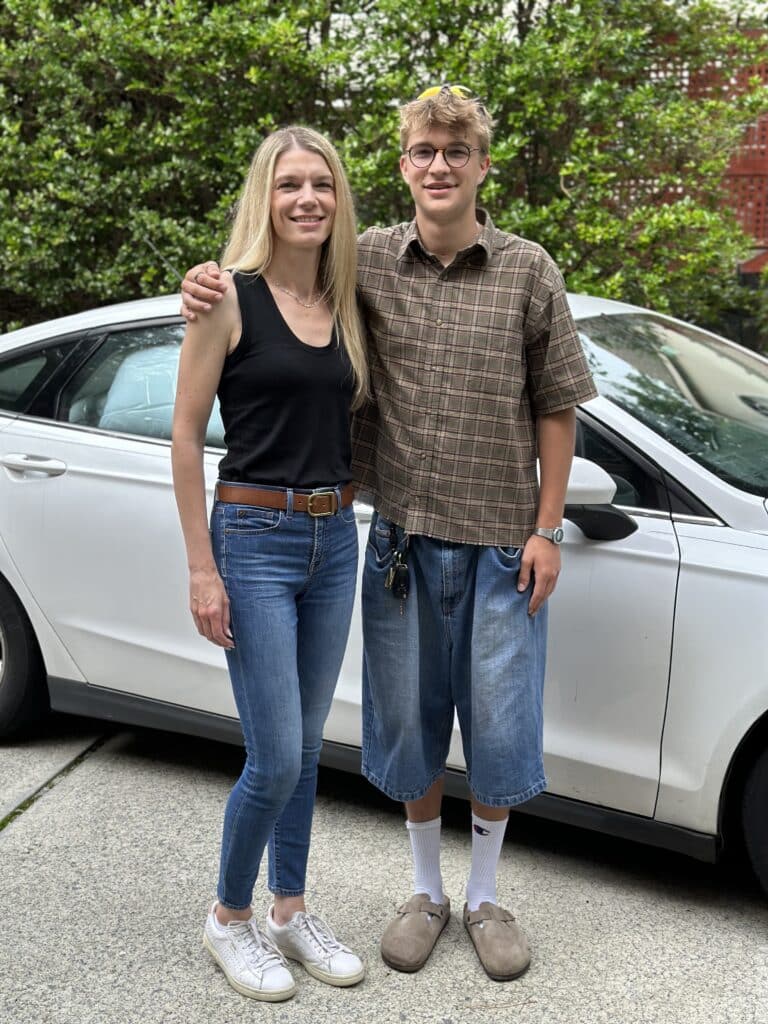
Lafourcade believes it was the ultimate opportunity for him to leave the nightmare behind and start afresh. Unfortunately, Lina was not as enthusiastic about leaving Switzerland during her senior high school year.
In the U.S., Theo continued his treatment at Children’s Healthcare of Atlanta Scottish Rite Hospital. Lafourcade trusted the capable doctors there implicitly. The American doctors simply picked up where their Swiss counterparts had left off.
Theo rang the bell at the end of his treatment in May 2020, making May of this year a particularly important anniversary. After five years, the likelihood of recurrence is significantly lower. Today, Theo is a sophomore at UGA, interested in studying medicine because he wants to give back.
Boss lady and super mom
The Lafourcades joined the FACC Atlanta upon moving to the U.S. to connect with the French community here. At the gala event of 2021 it was announced that the executive director would be returning to Europe. Acquaintances suggested Lafourcade was made for the job.
The position involves speaking French; it instantly sparked her interest. After doing some research about the role, the nature of non-profit organizations and the mission of the chamber, Lafourcade concluded it would be a good fit. She started in January of 2022.
There was some juggling of car rides, study help and college visits. “You have to be clever with the hours you work. The chamber isn’t a [traditional] 9-to-5. There’s a lot of afterwork stuff. It can be a fairly unusual time frame that I work within, especially with France, you’ve got the six hour time difference,” Lafourcade shared.
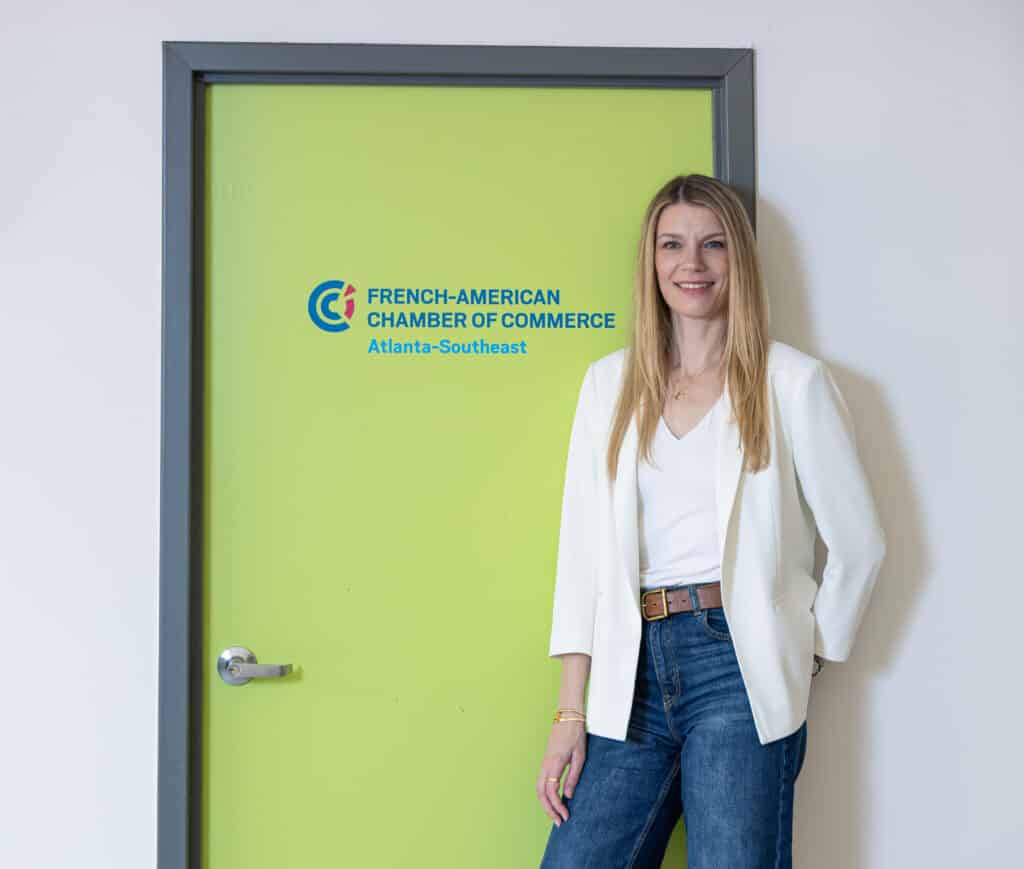
She considers herself lucky to have more flexibility than she would in a typical office environment. Some days are long, but her children see the value in what she does, and that motivates Lafourcade.
Her vision is for the chamber to be the “go-to” for any French companies here, all Francophiles in Atlanta and any French companies moving in. She collaborates closely with The Alliance Française and the French Consulate to support the vibrant French community in metro Atlanta.
According to Lafourcade, board members have noted the chamber’s improved position under her leadership over the past three years.
The FACC Atlanta-Southeast was founded in 1985. After highs, lows and multiple changes, they celebrated 40 years this past February. “We’re looking to go onward and upward,” Lafourcade smiled.
Despite talks of tariffs creating challenges, the FACC’s mission remains the same: to provide a soft landing for French companies establishing themselves in the region.
The floodgates open
In May 2022, a significant change occurred: the Food and Drug Administration lifted the “mad cow” (variant Creutzfeldt-Jakob disease) restrictions on blood donation for people who had lived or traveled in the United Kingdom, France and Ireland from 1980 onward. The Lafourcades were delighted; they were finally eligible to donate.
“It’s the notion of giving back, it’s community, it’s people in need,” Lafourcade said. “I never thought that I would be in a situation where anonymous blood donors would save my son’s life. And yet, that’s what happened.”
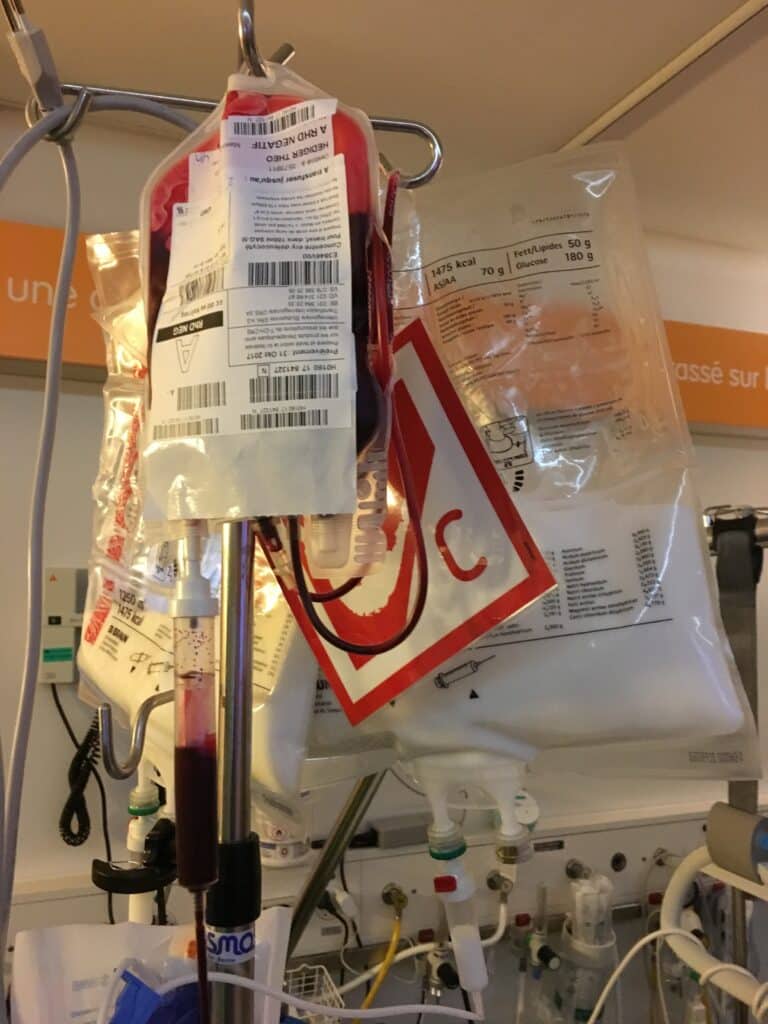
Although it may be human nature to think this type of misfortune only befalls others, Lafourcade feels we must ask ourselves, “What if one day it’s you or your child?” Because human blood can’t be manufactured, we’ll always depend on people’s generosity for it.
Initially, she alerted members of the FACC Atlanta that the rules of blood donation had changed for them. “I’m going to use my voice as the leader of the chamber to get the word out. One side of it is the expat community. Another side is people stopped donating during COVID and haven’t gotten back to it,” she shared.
Lafourcade believes her story can serve to strengthen a sense of community, particularly in a world feeling increasingly uncertain. “We’re in such a weird world right now where everything is scary, and people don’t know what the future holds,” she said.

She focuses on tangible actions people can take to quell that dreadful feeling of helplessness. And, having been on the receiving end of this life-saving practice, she wishes to inspire others to donate.
“Giving blood is free! You can do it several times a year and you will for a fact be helping somebody. It’s a case of helping your neighbor and doing something good if you can.”
Raising awareness
Turning trauma into positive action, Lafourcade feels a sense of duty to host blood drives. My husband and I were donors at her first one last September.
It was a painless, streamlined process. Snacks and refreshments were generously provided. Meeting community members and greeting Lafourcade were perks.
“The first one that you came to … we did a great job. Our goal for the drive was 18 units and we smashed that, we got 34 units,” Lafourcade beamed.
To spread the word beyond the FACC, she is now reaching out to the communities in which she lives and works — Johns Creek and Peachtree Corners respectively — to share her experience and encourage participation.
World Blood Donor Day
Lafourcade is hosting her next Red Cross Blood Drive at Curiosity Lab on World Blood Donor Day, Saturday, June 14, from 11:30 a.m. to 4:30 p.m., and encourages residents to help in whatever way they can.
“I want everybody in Peachtree Corners thinking, ‘I want to do my part.’ If people can’t give blood they can volunteer or help spread the word,” she said.
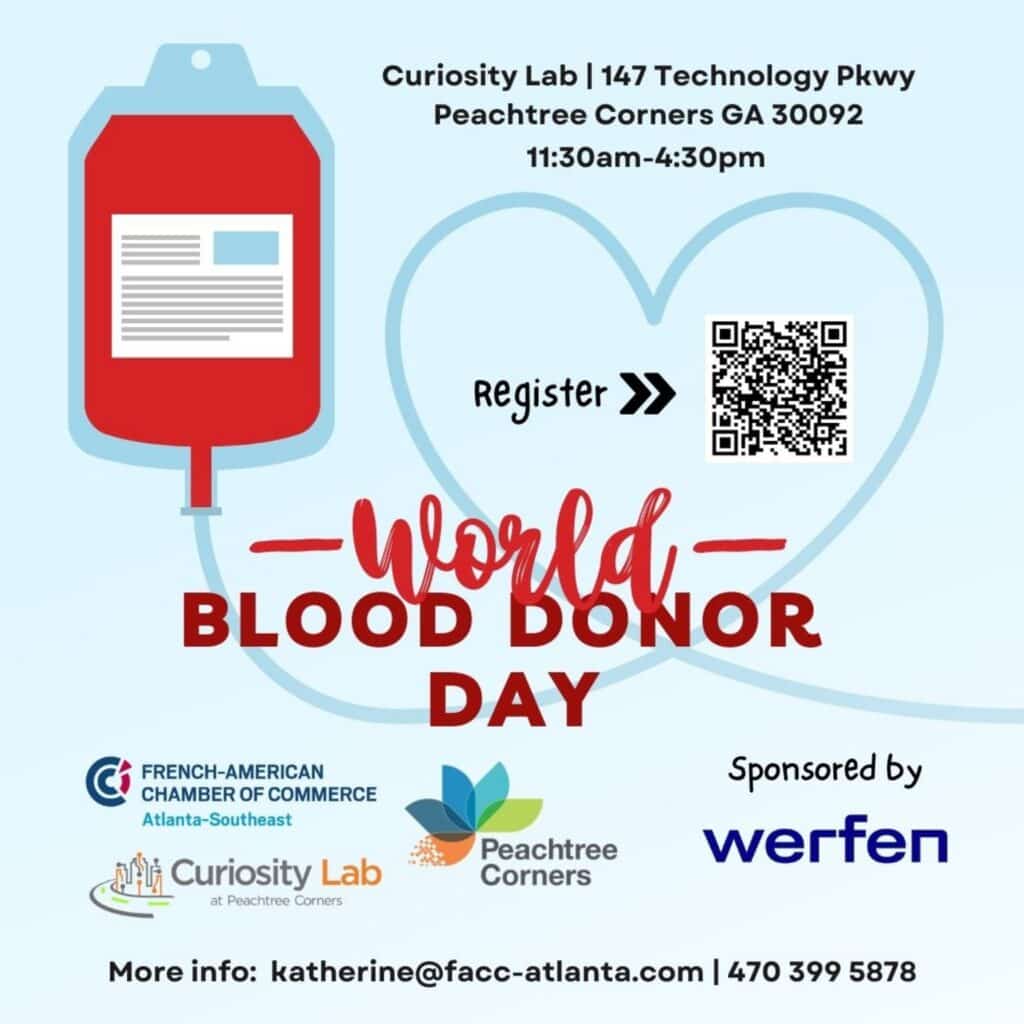
You can sign up to donate on the FACC Atlanta website or download the American Red Cross Blood Donor app to schedule and manage appointments and follow your blood’s journey to see where it gets used.
A woman in leadership
Katherine Lafourcade — executive director of the French American Chamber of Commerce Atlanta–Southeast, a passionate advocate for cultural and business exchange and a resilient mother — has journeyed from a schoolgirl captivated by the French language to leading a prominent bi-national organization.
Her story is one of determination, adaptability and turning profound personal challenges into a powerful force for good.
For more about the FACC Atlanta-Southeast or to sign up for the June blood drive, visit facc-atlanta.com. You can also connect with the organization on LinkedIn.
Related
City Government
The Future of Law Enforcement in Peachtree Corners: Community Meeting
Published
3 weeks agoon
April 14, 2025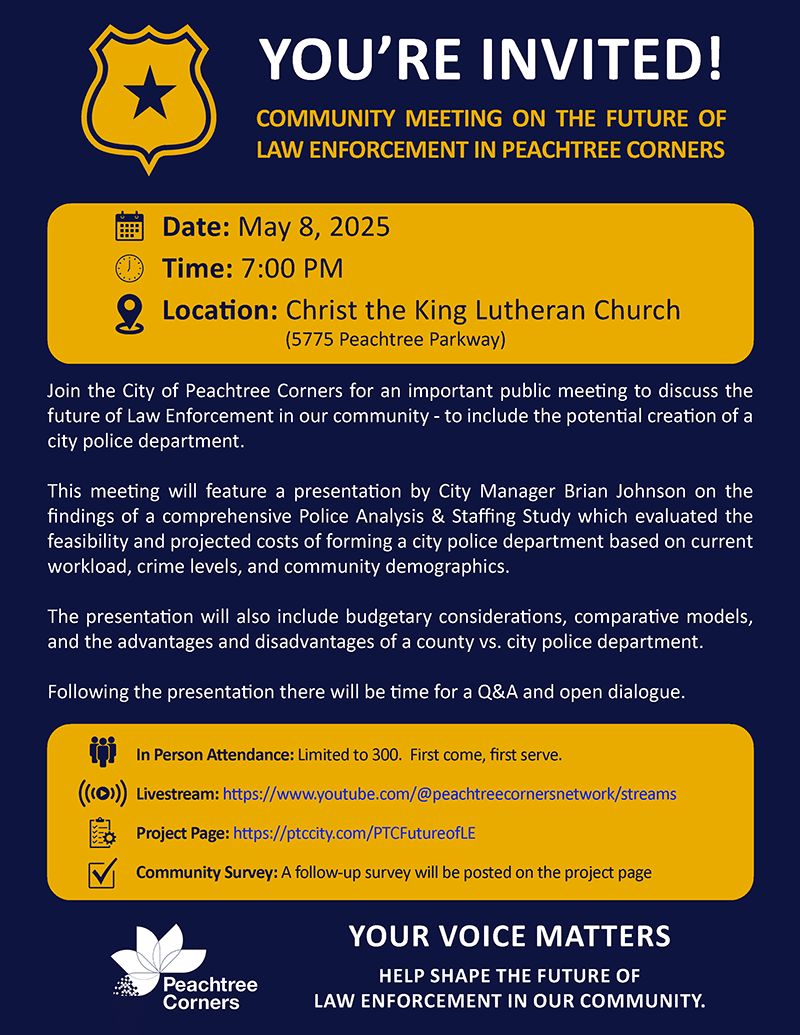
The City of Peachtree Corners will hold an important public meeting on May 8 to discuss the future of law enforcement in our community — including the potential creation of a city police department.
This meeting will feature a presentation by City Manager Brian Johnson on the findings of a comprehensive Police Analysis & Staffing Study that evaluated the feasibility and projected costs of forming a city police department based on current workload, crime levels and community demographics.
The presentation will also include budgetary considerations, comparative models and the advantages and disadvantages of a county vs. city police department.
Following the presentation, there will be time for a Q&A and open dialogue.
In-person attendance is limited to 300. First come, first served. A livestream option will be available for those who can’t attend in person.
After the meeting, a follow-up survey will be available on the city’s project page.
Meeting details
The Future of Law Enforcement in Peachtree Corners
Date/Time: May 8, 2025 at 7 p.m.
Location: Christ the King Lutheran Church (5775 Peachtree Parkway)
For more information, visit peachtreecornersga.gov.
Related
Read the Digital Edition
Subscribe
Keep Up With Peachtree Corners News
Join our mailing list to receive the latest news and updates from our team.
You have Successfully Subscribed!

GA Tech, Peachtree Corners Solidify Partnership with First-of-its-Kind Venue

Peachtree Corners City Guide 2025: Spring/Summer Digital Edition

Two Peachtree Corners Business Leaders Named Finalists for EY Entrepreneur Award

GA Tech Launches First-of-its-Kind GT Atrium in Peachtree Corners

Katherine Lafourcade — A Journey of Passion, Resilience and Giving Back

PCBA Announces 2025 Scholarship Winner

Paul Duke STEM High School Student Earns CGO Scholarship

World Blood Donor Day Starts Here: Theo’s Miracle, Katherine’s Mission [Podcast]

Digital Edition

World Blood Donor Day Starts Here: Theo’s Miracle, Katherine’s Mission [Podcast]

Paul Duke STEM High School Student Earns CGO Scholarship

PCBA Announces 2025 Scholarship Winner

Katherine Lafourcade — A Journey of Passion, Resilience and Giving Back

GA Tech Launches First-of-its-Kind GT Atrium in Peachtree Corners

Peachtree Corners City Guide 2025: Spring/Summer Digital Edition

Two Peachtree Corners Business Leaders Named Finalists for EY Entrepreneur Award

Light up the Corners [Video]

Capitalist Sage: Business Leadership in Your Community [Podcast]

Cliff Bramble: A Culinary Adventure through Italy

Top 10 Brunch Places in Gwinnett County

A Hunger for Hospitality

THE CORNERS EPISODE 3 – BLAXICAN PART 1

Top 10 Indoor Things To Do This Winter

The ED Hour: What it takes to Remove Barriers from Education



